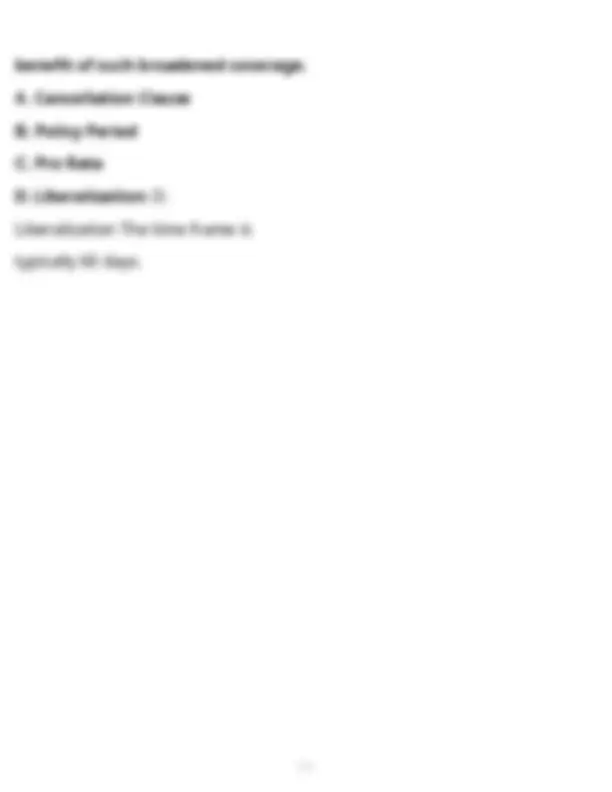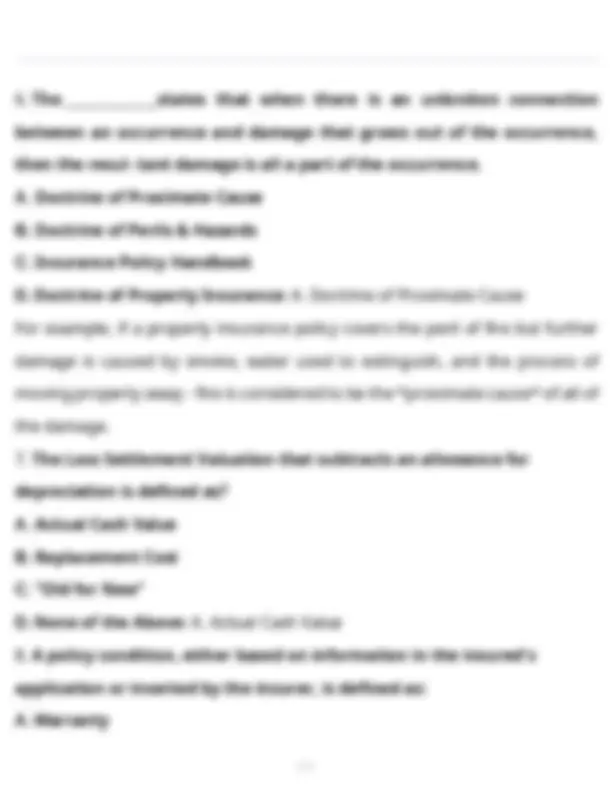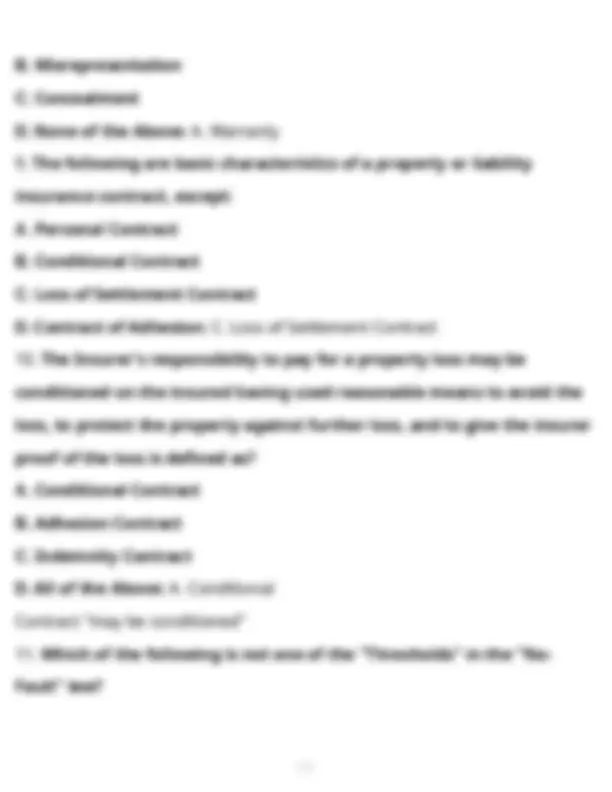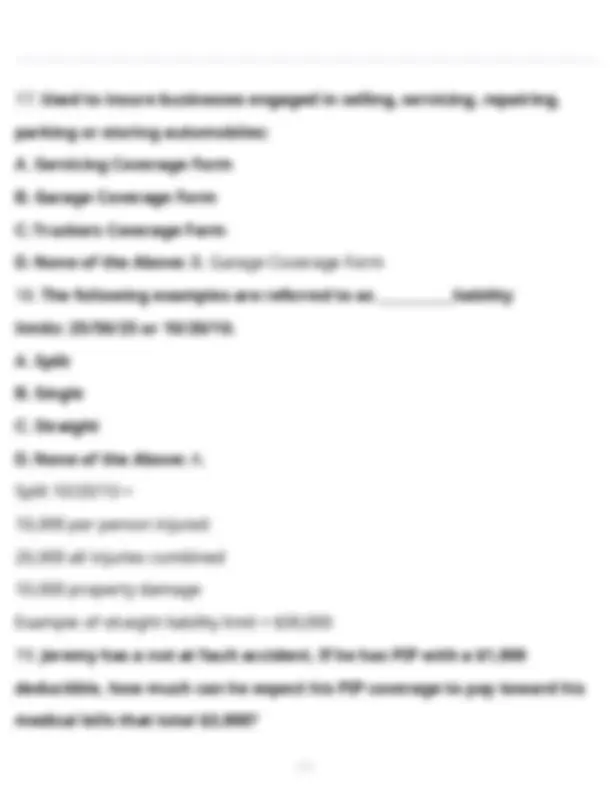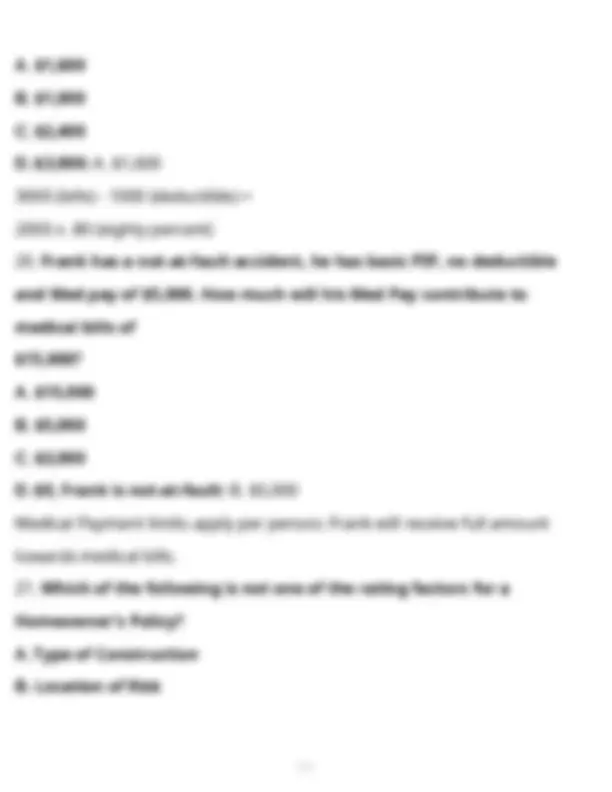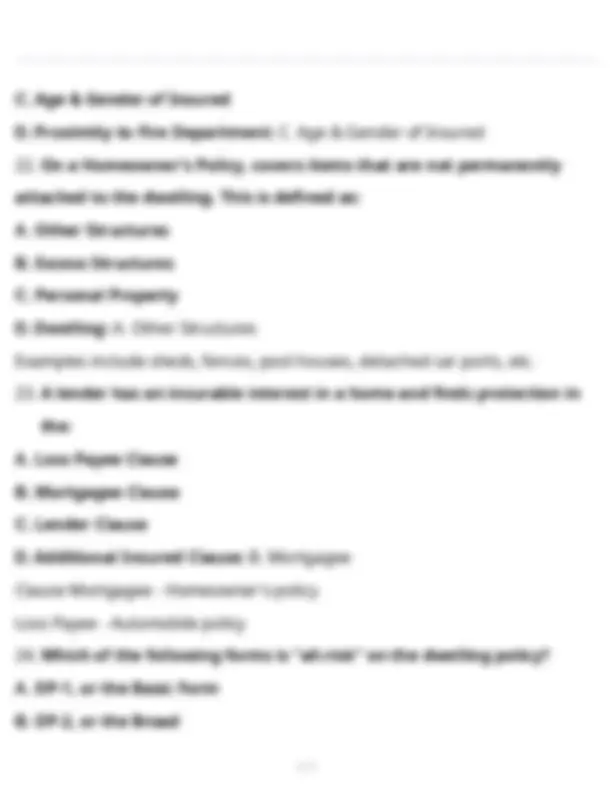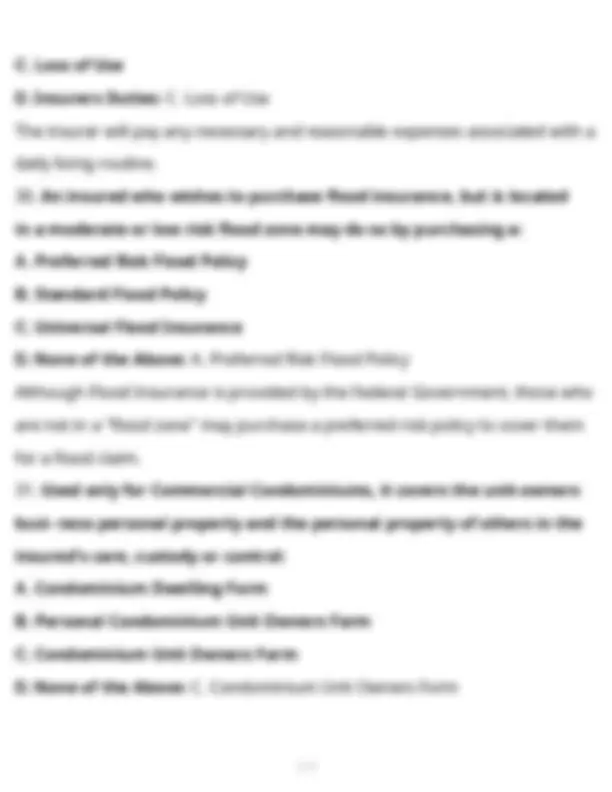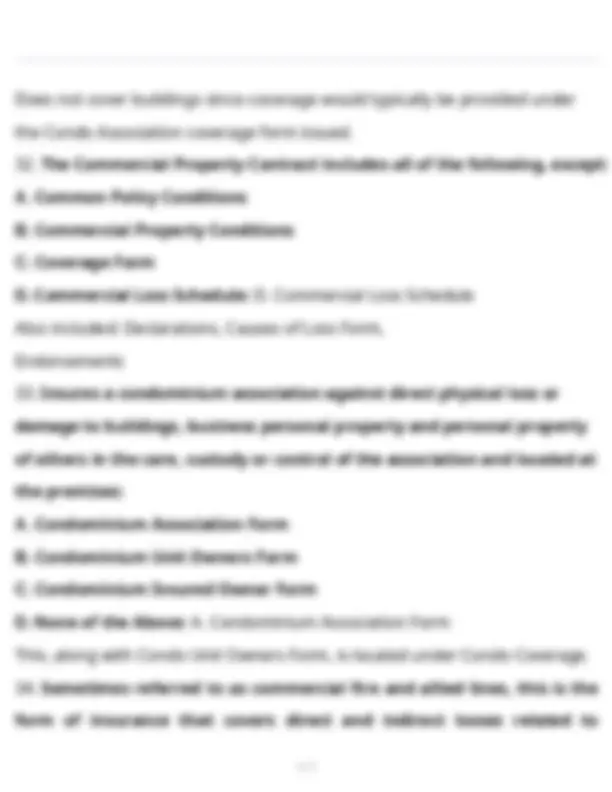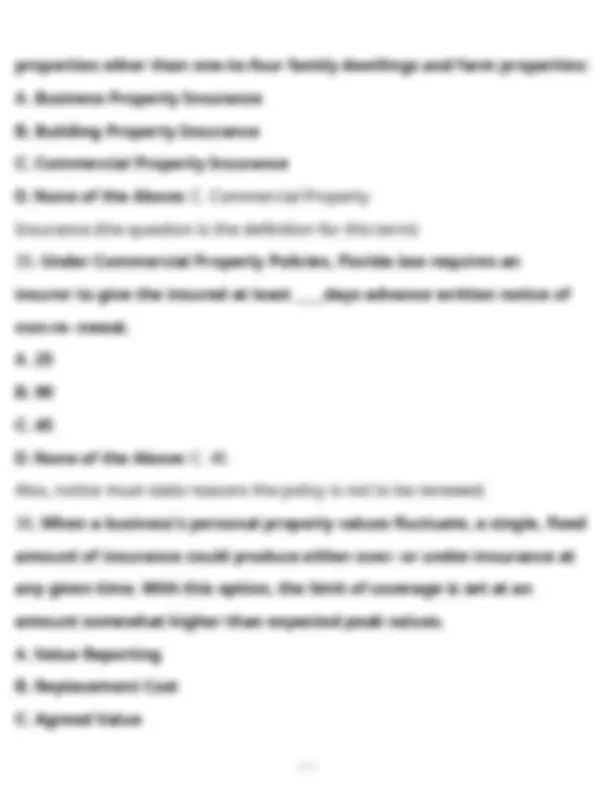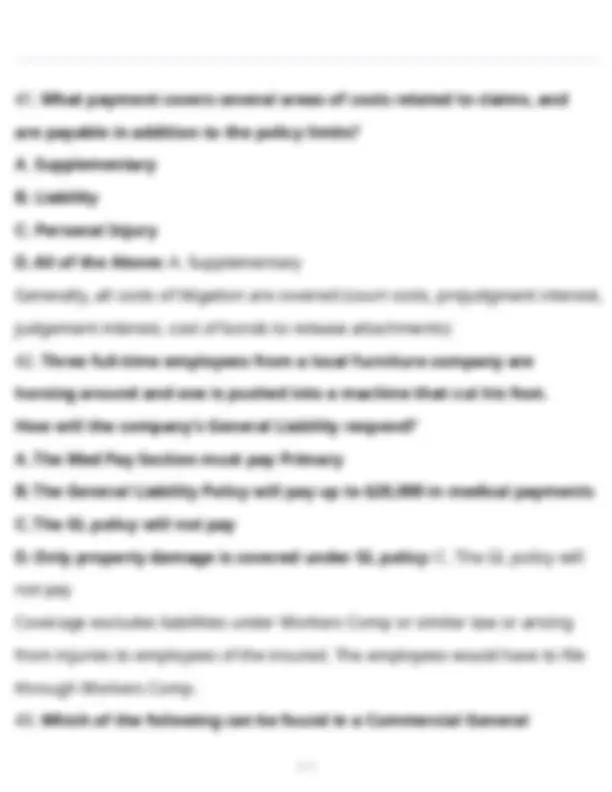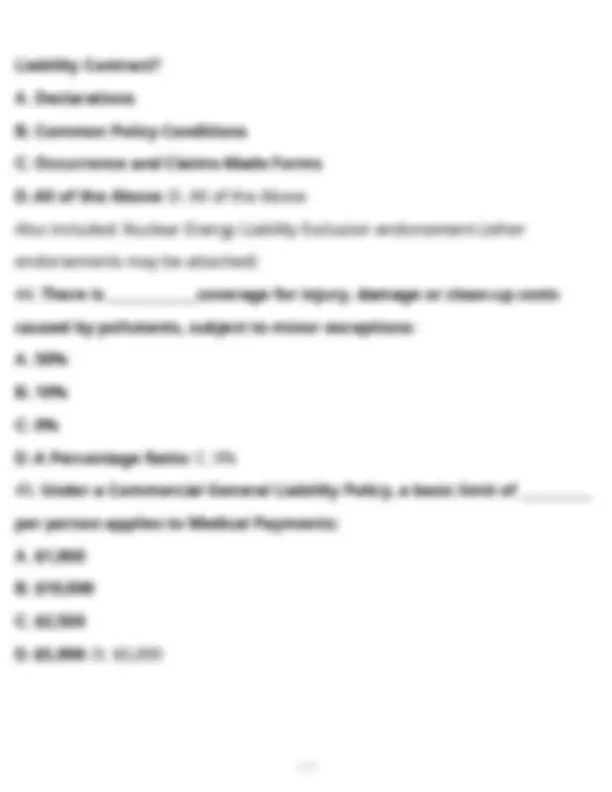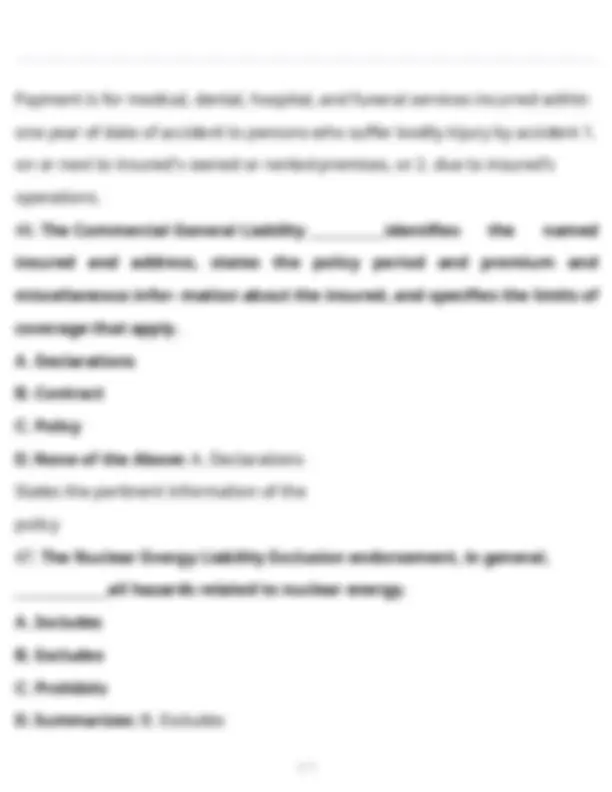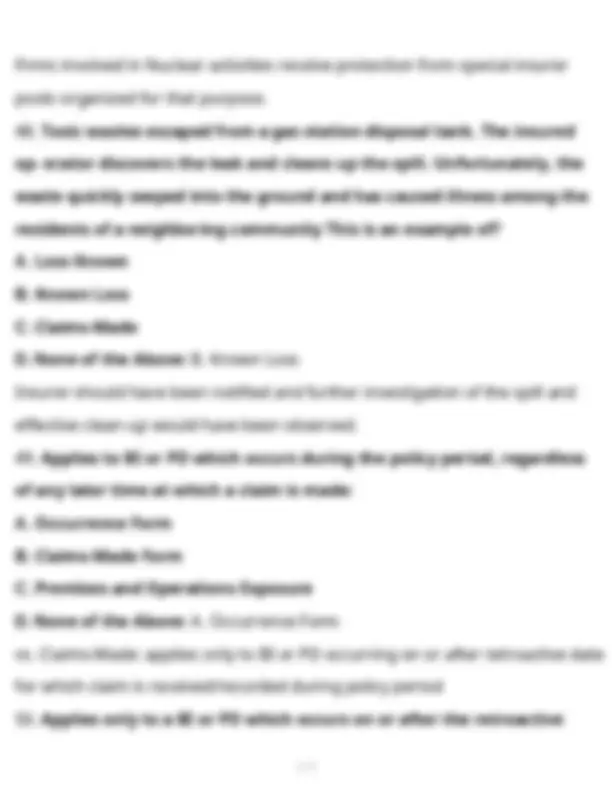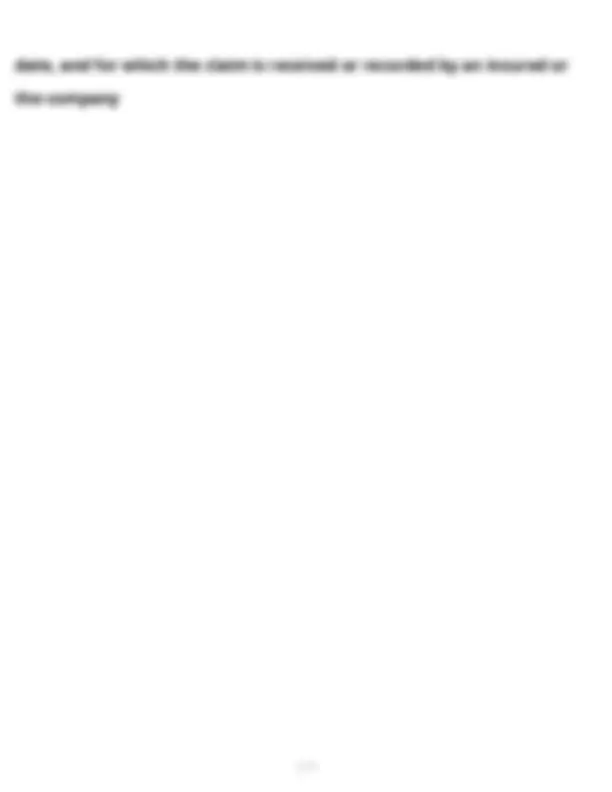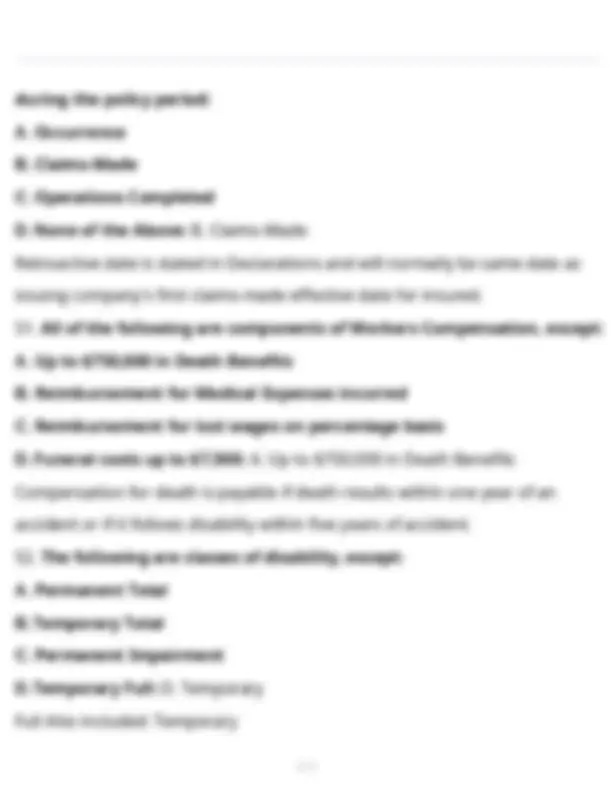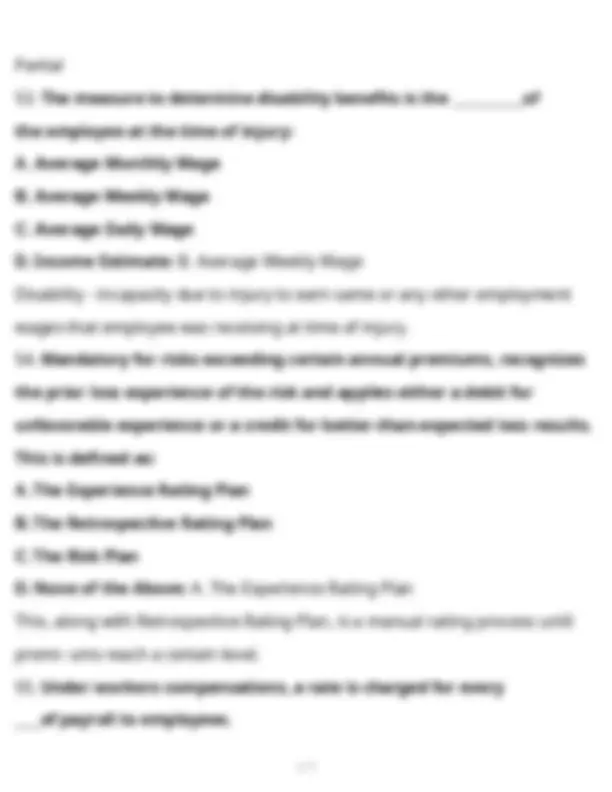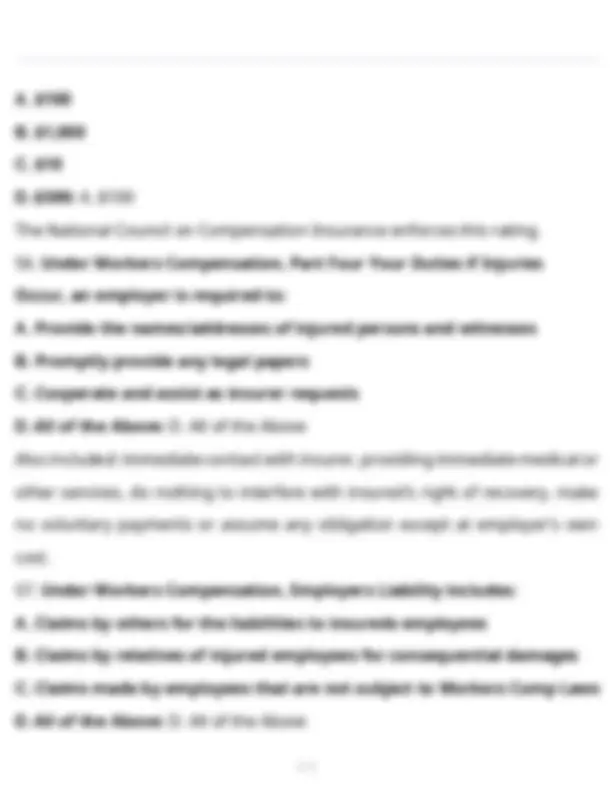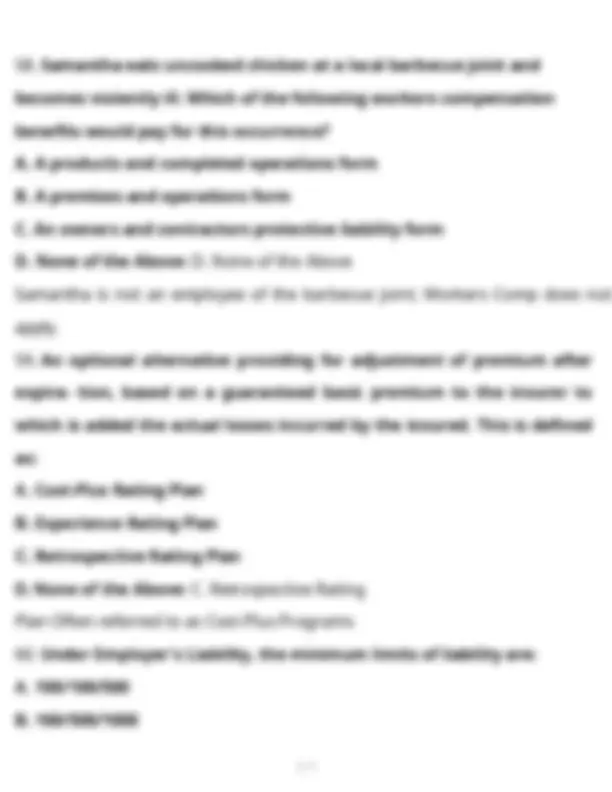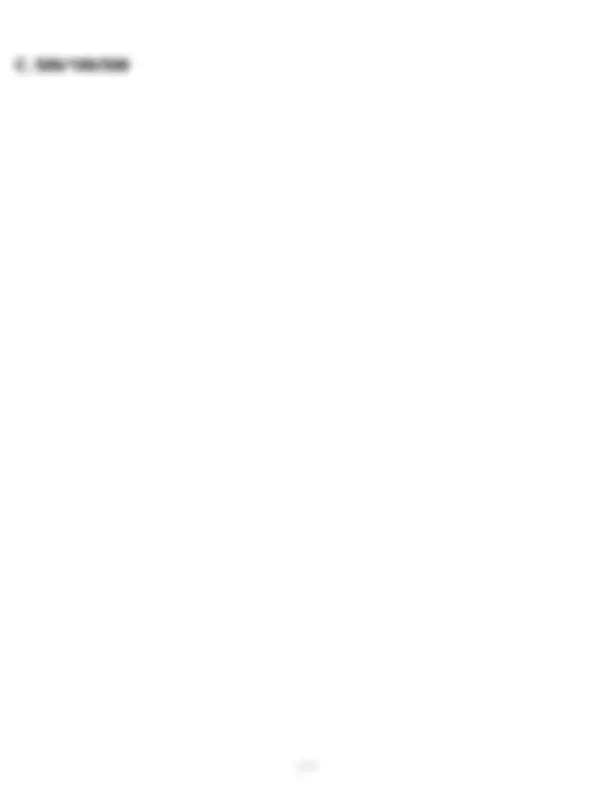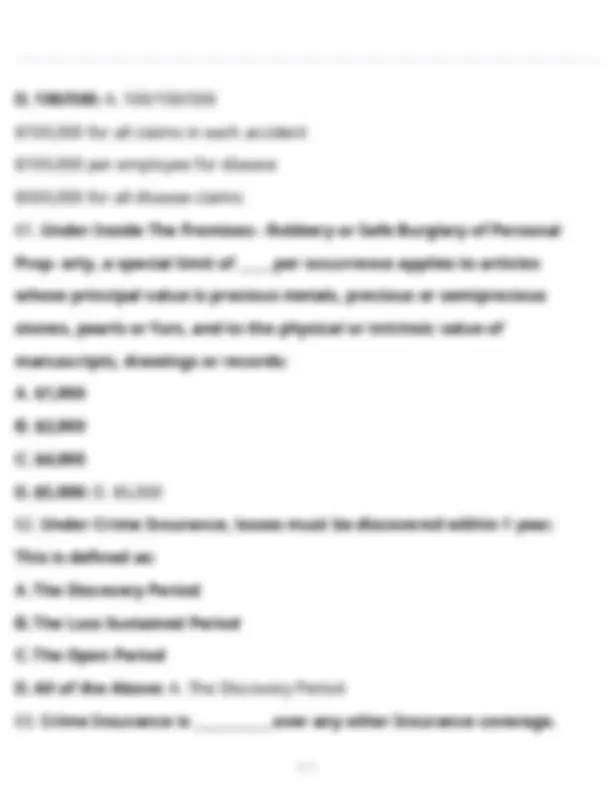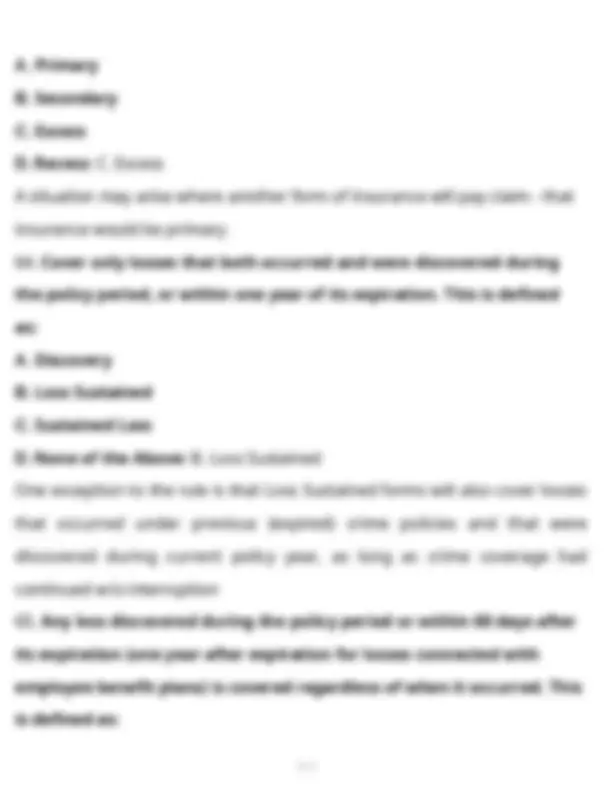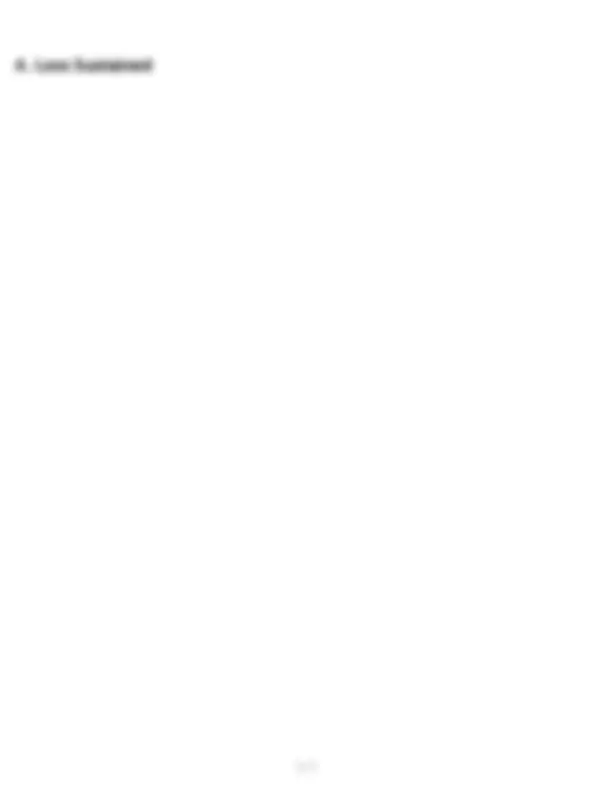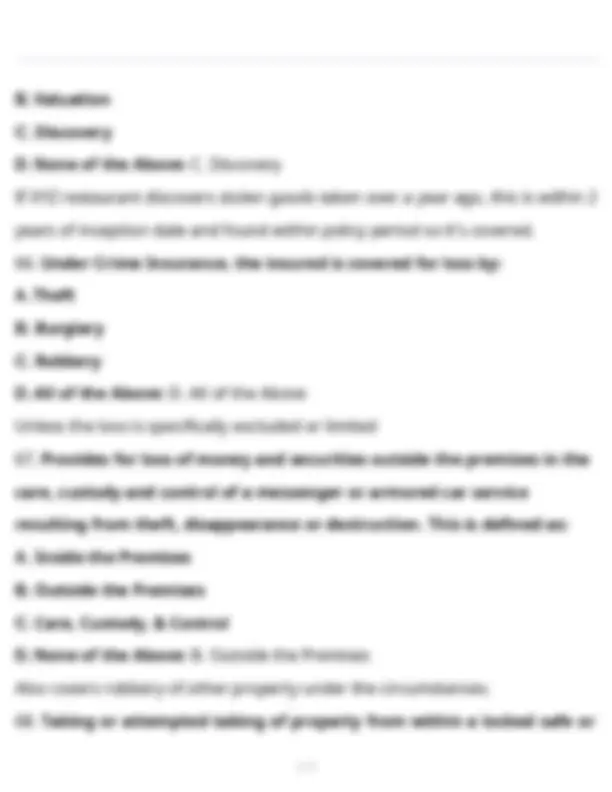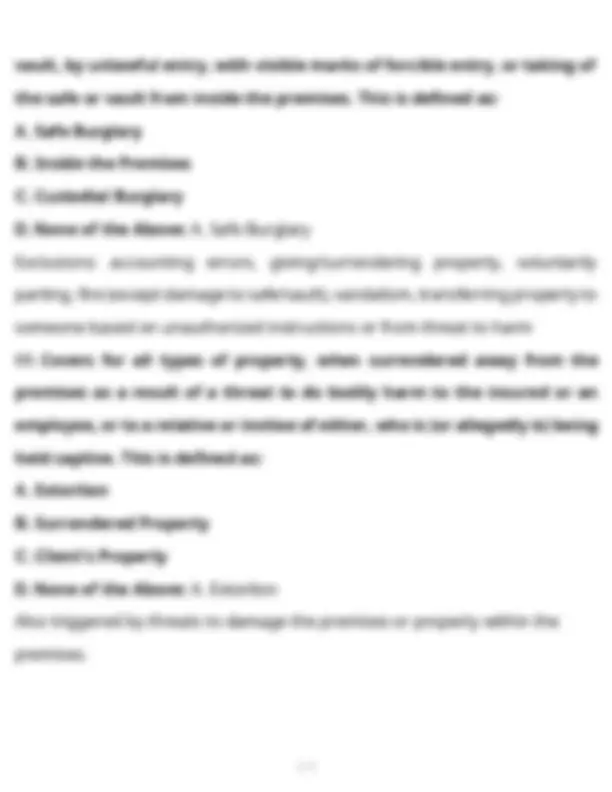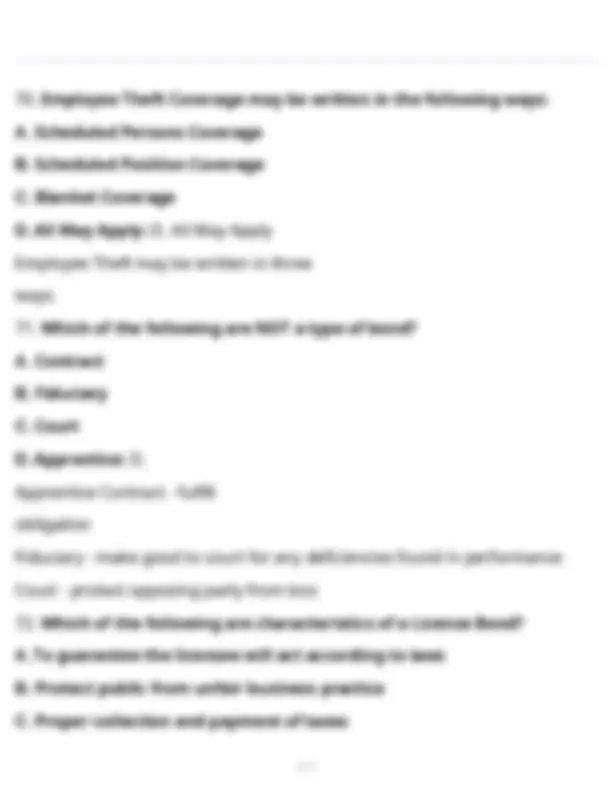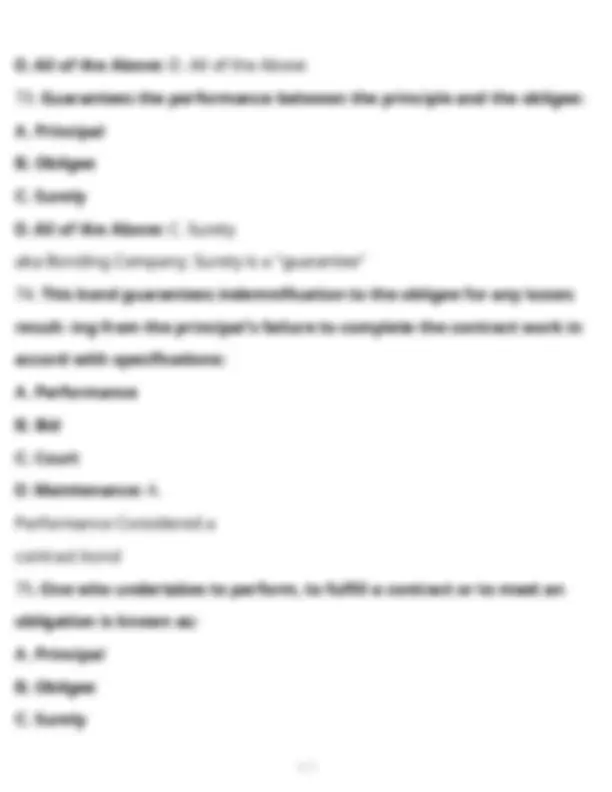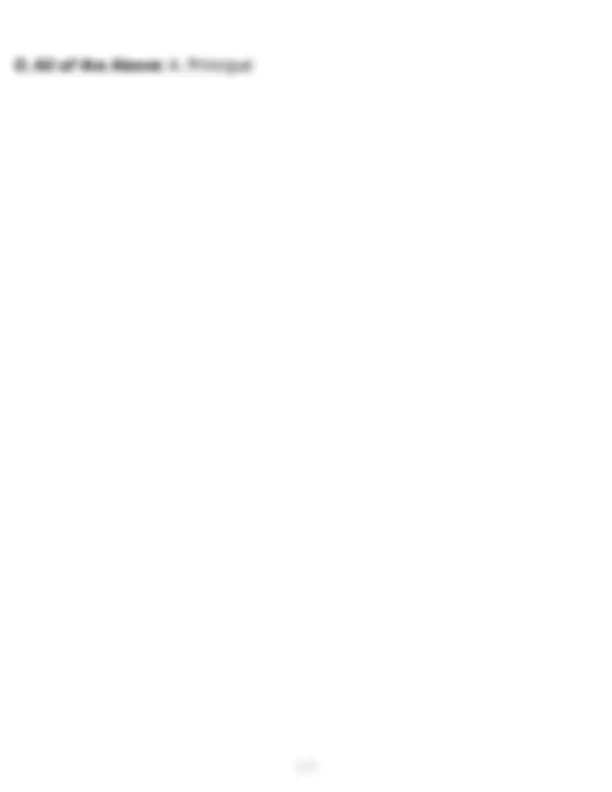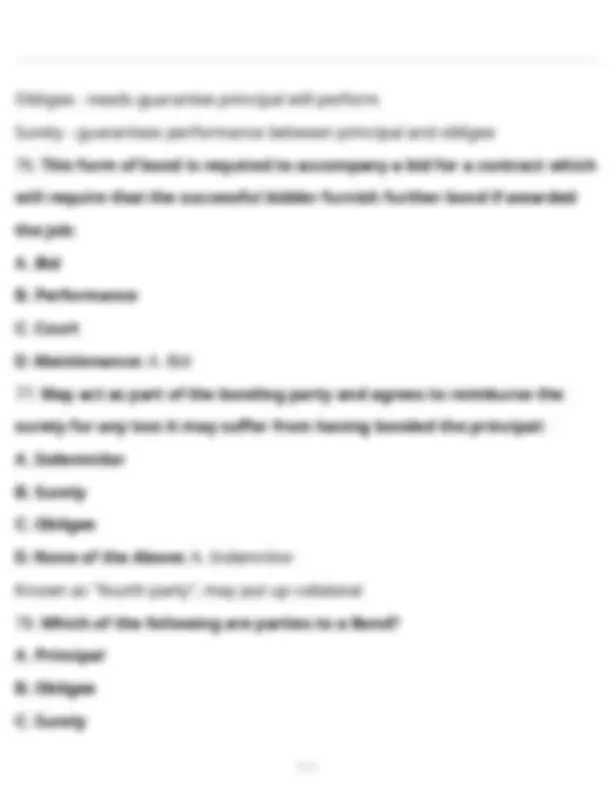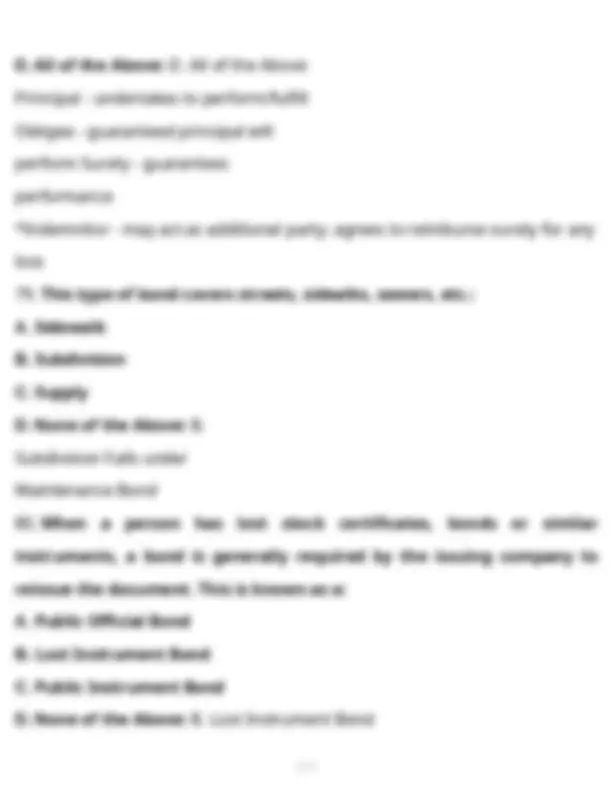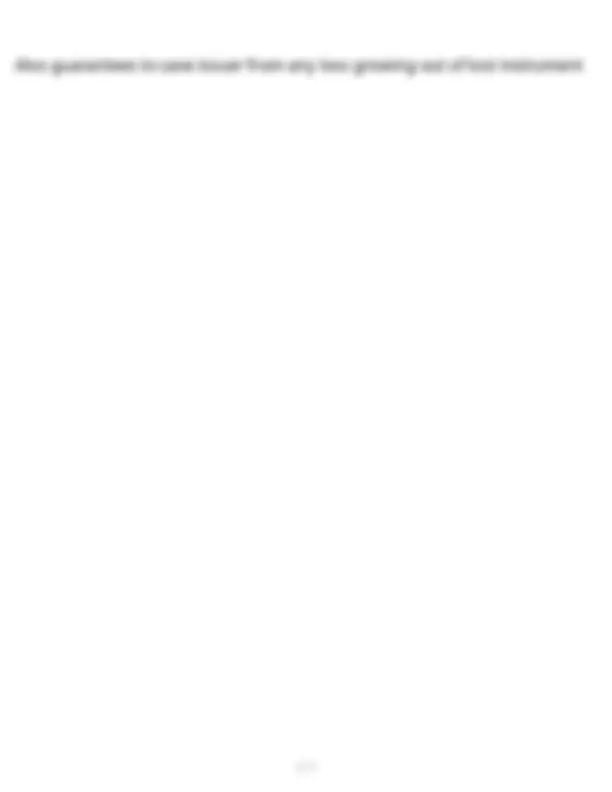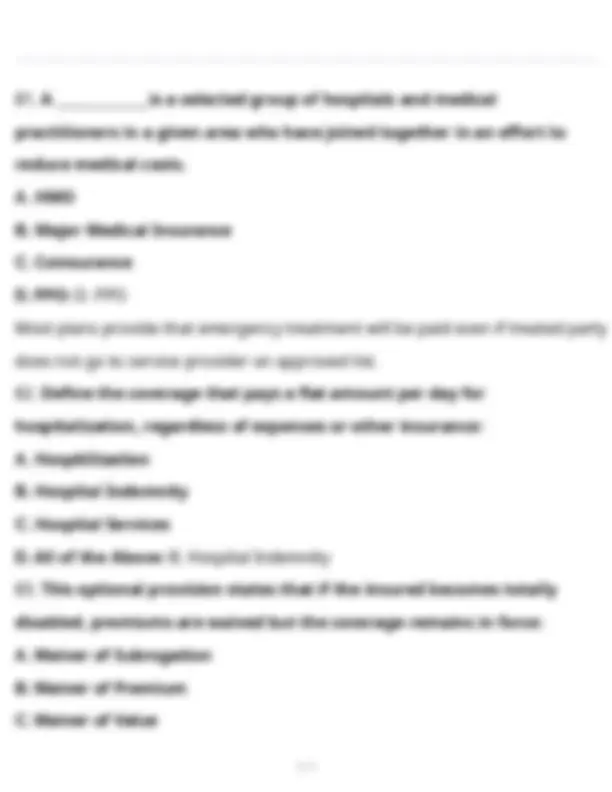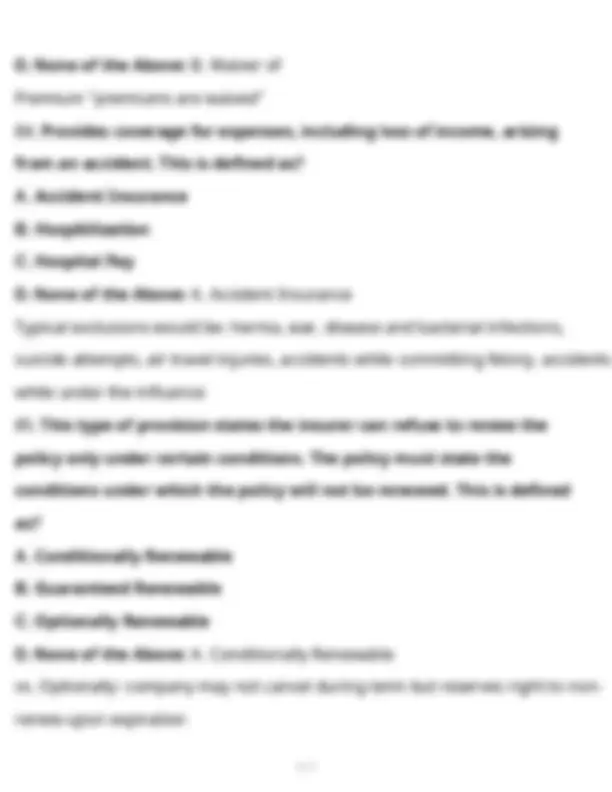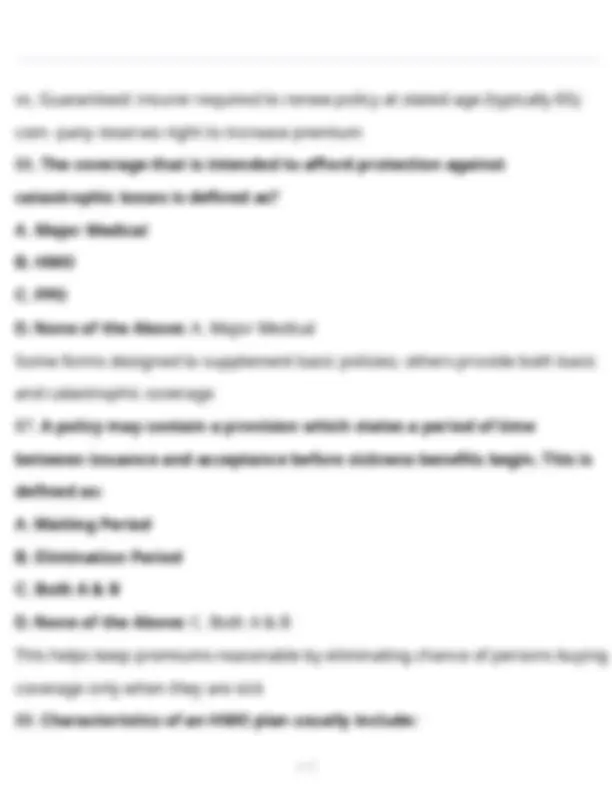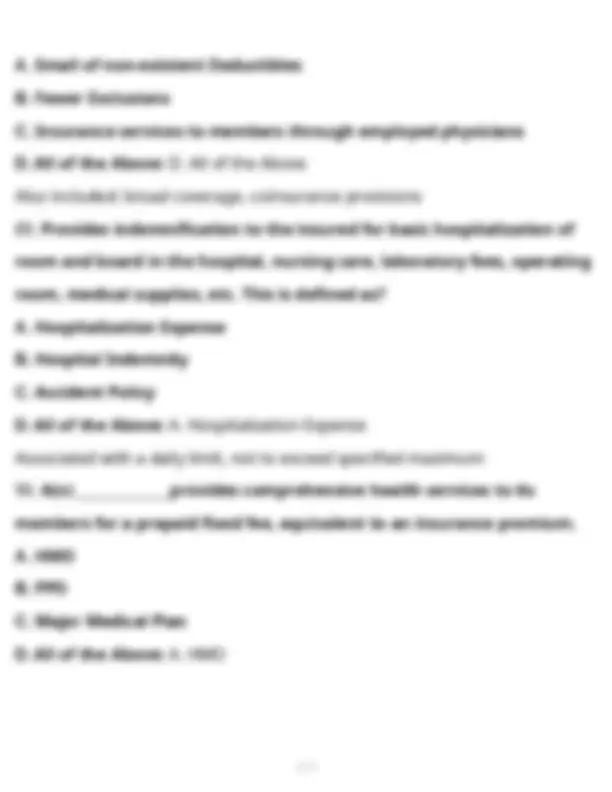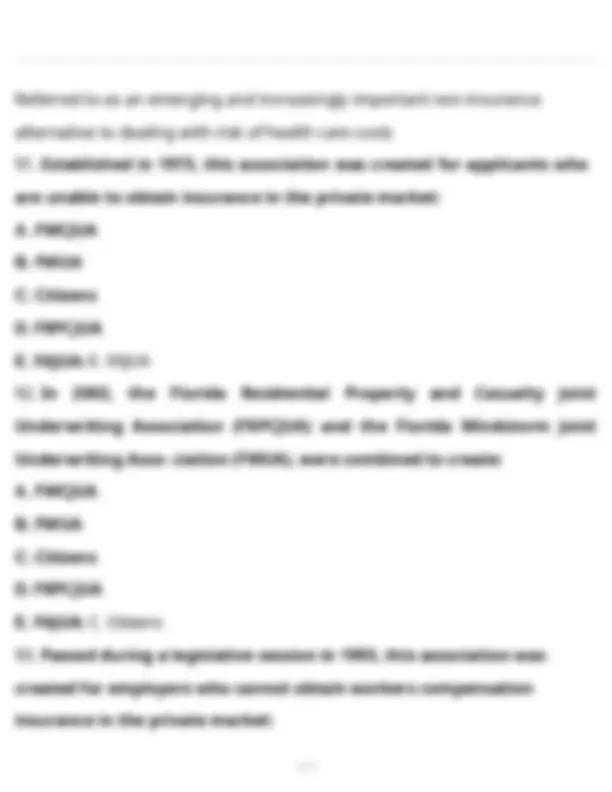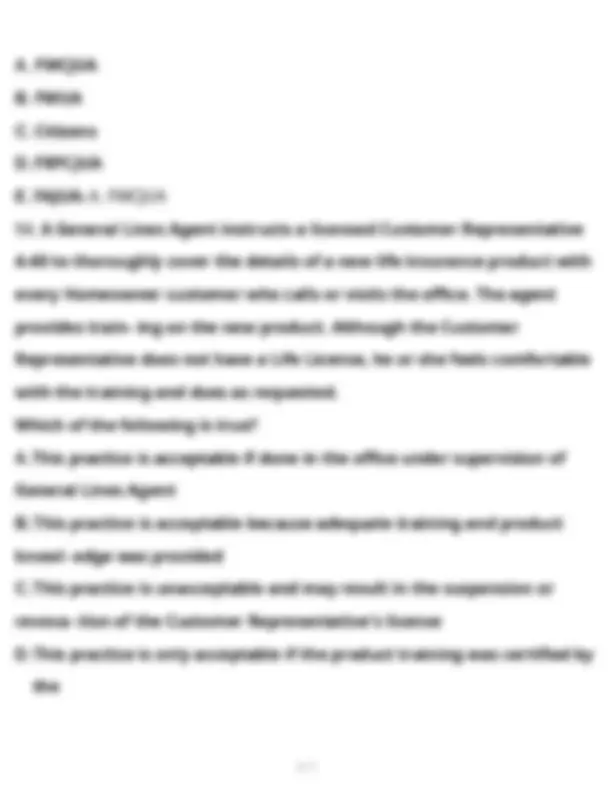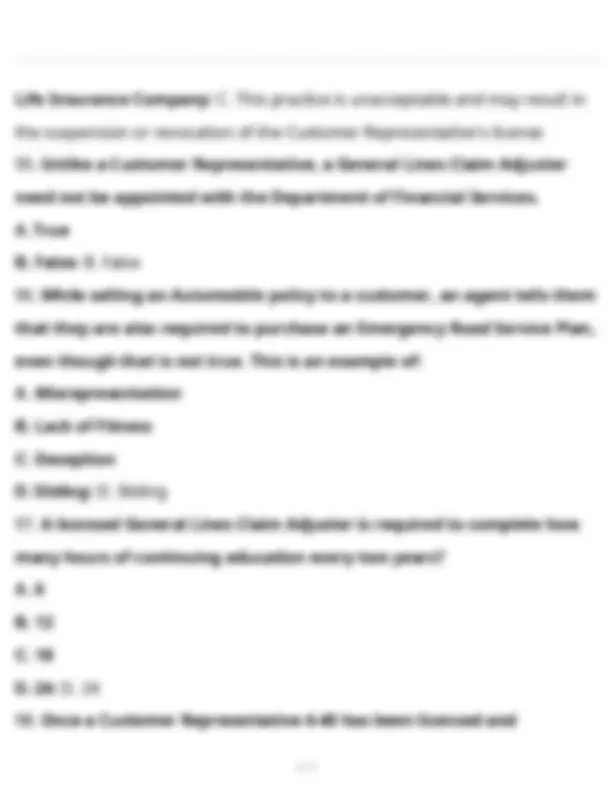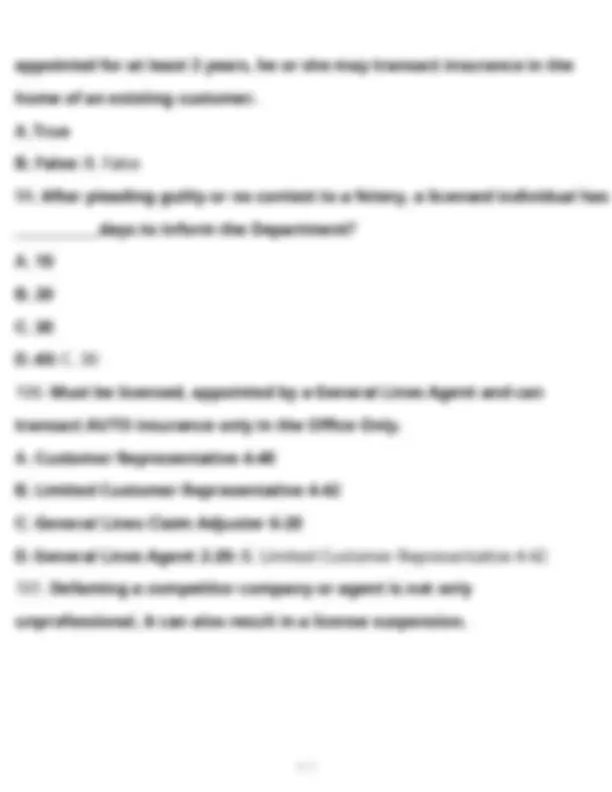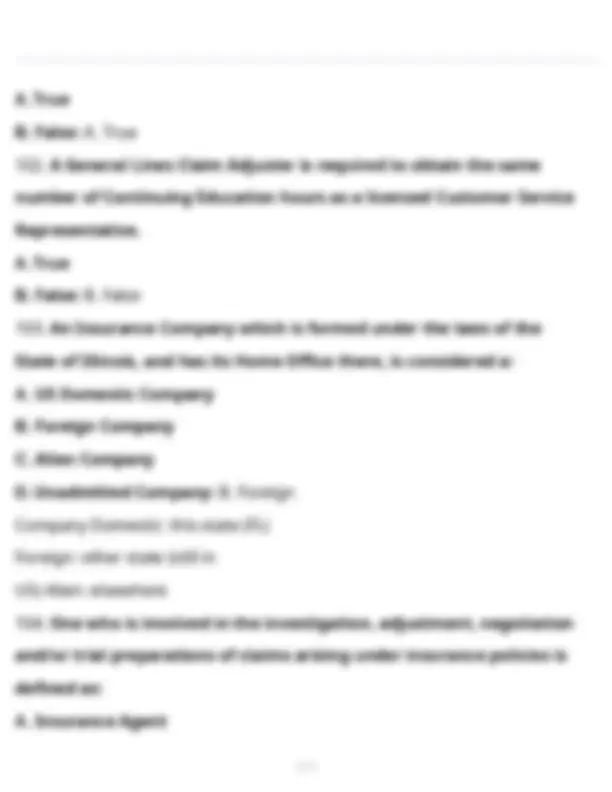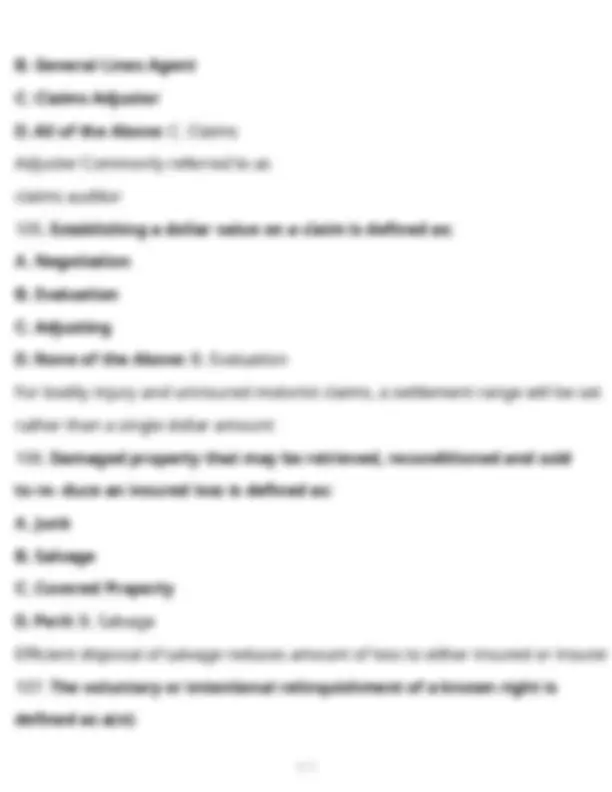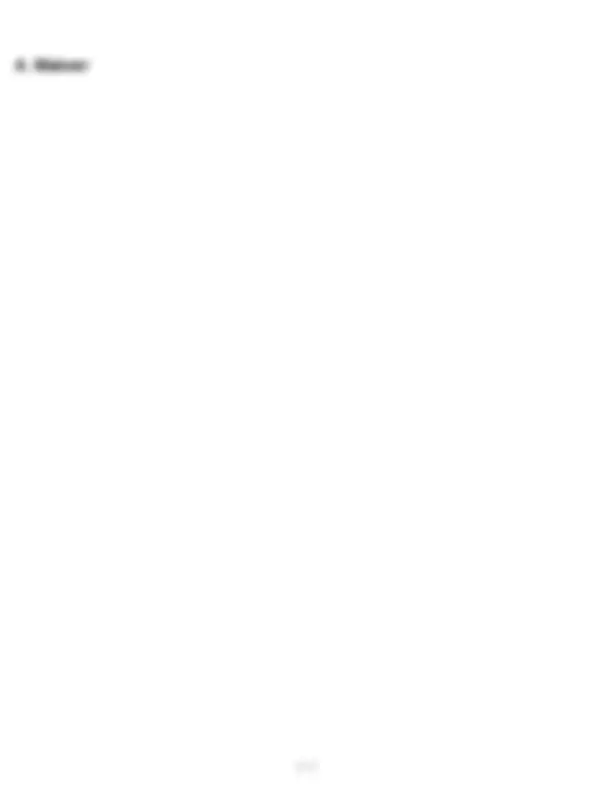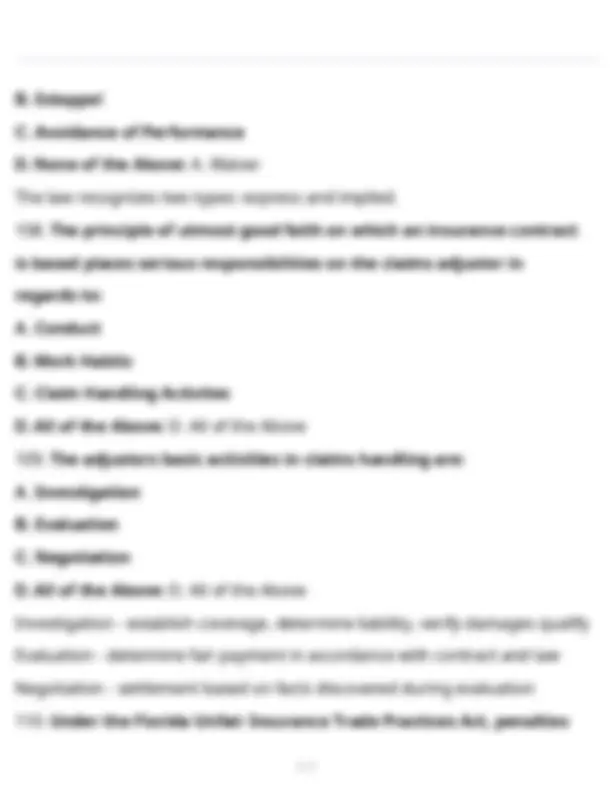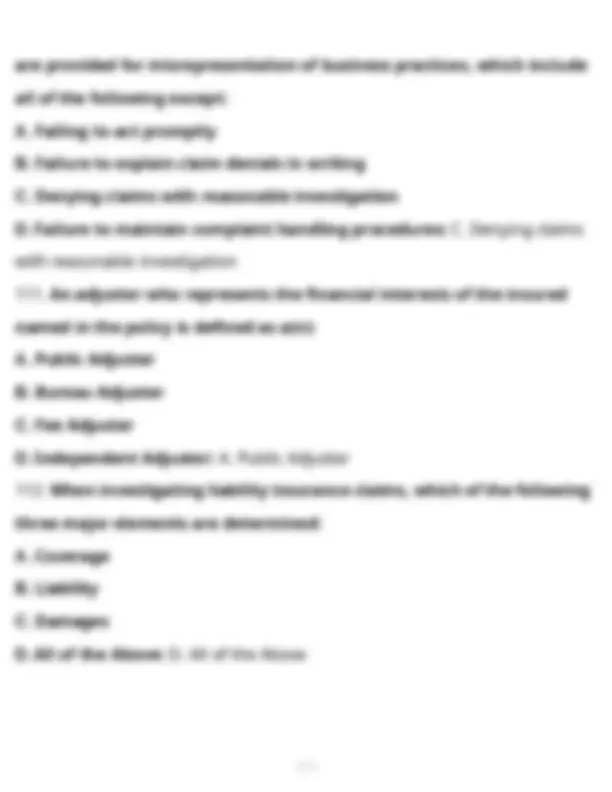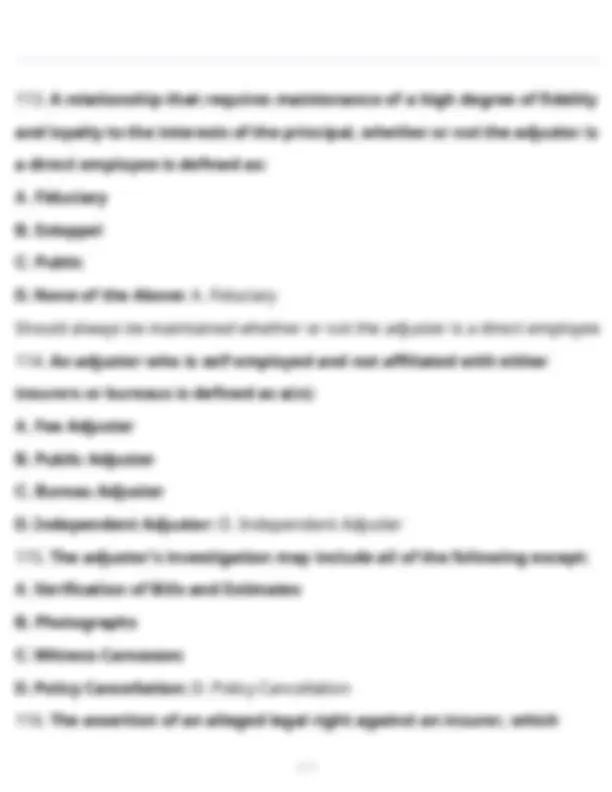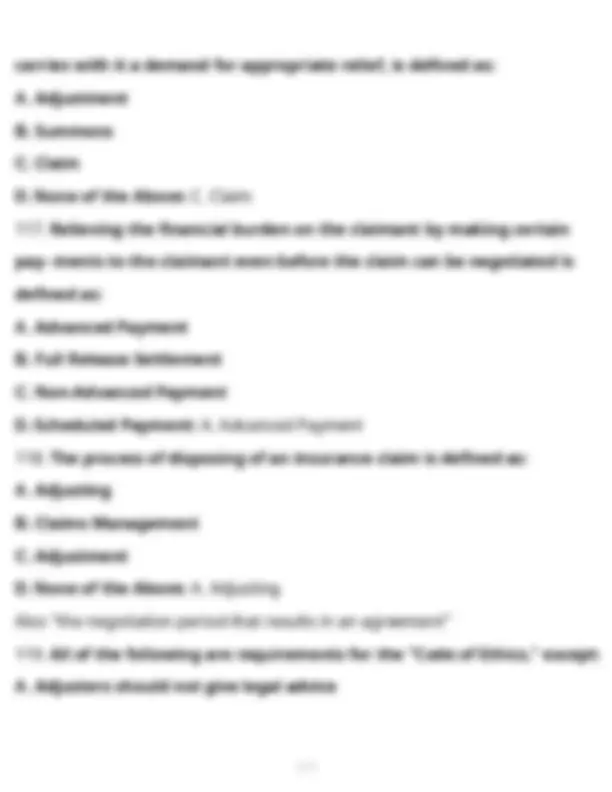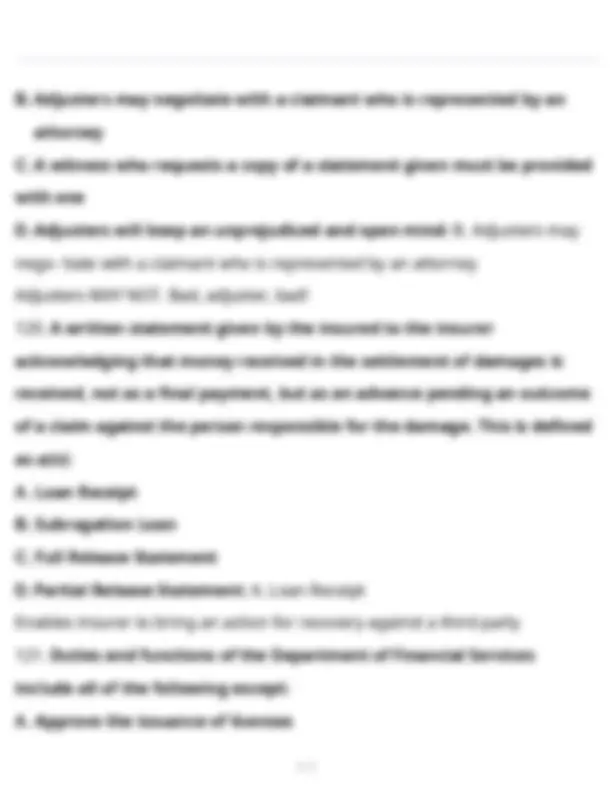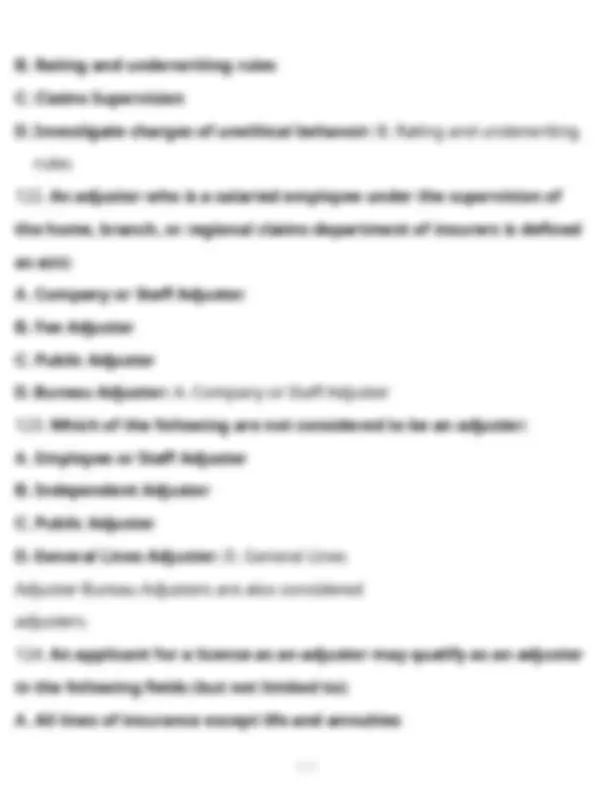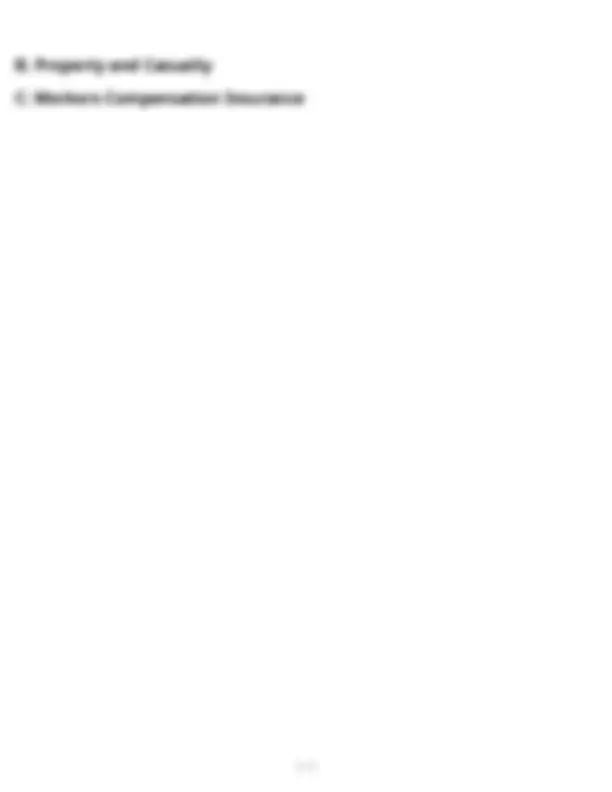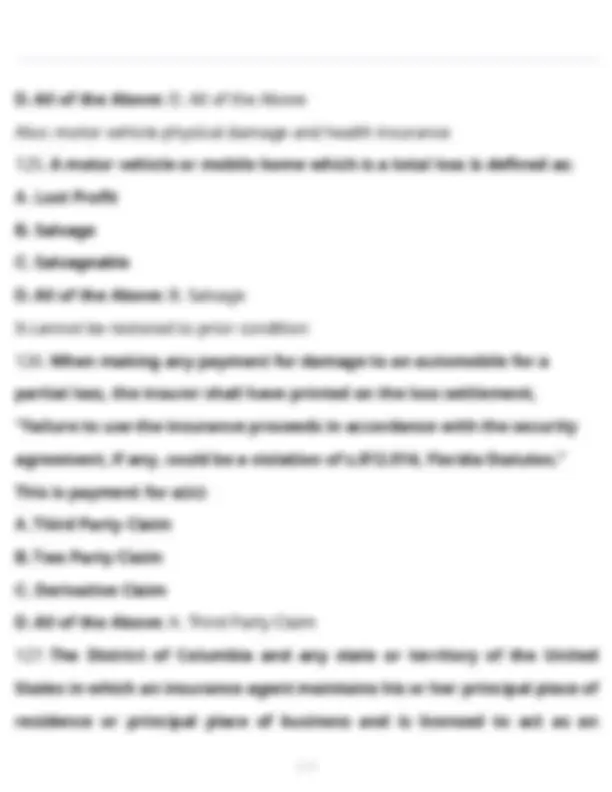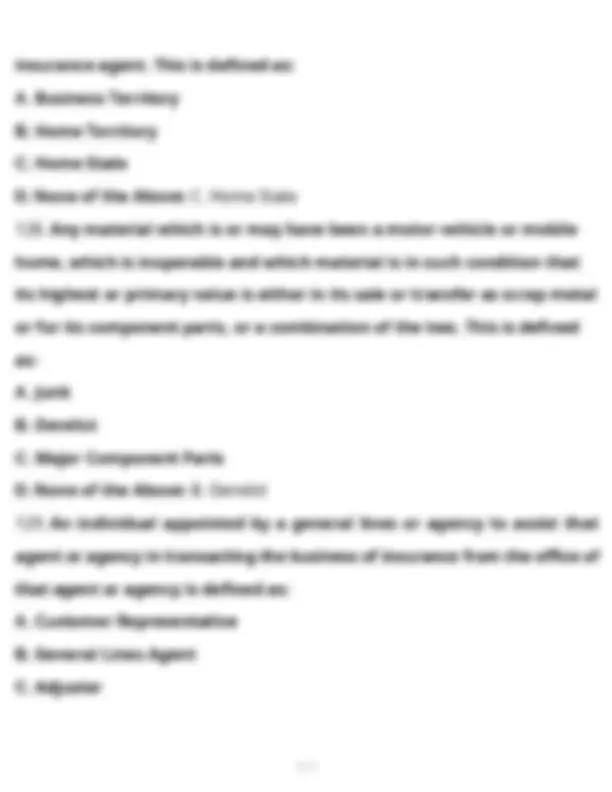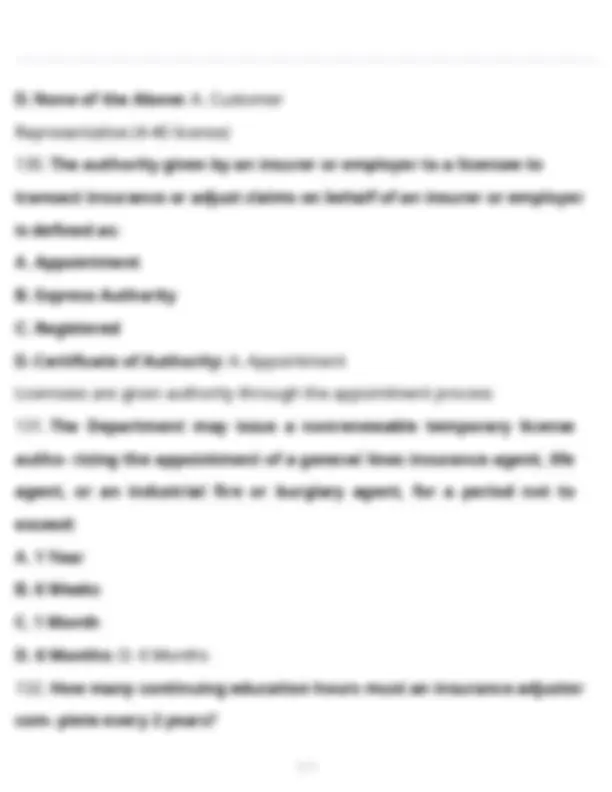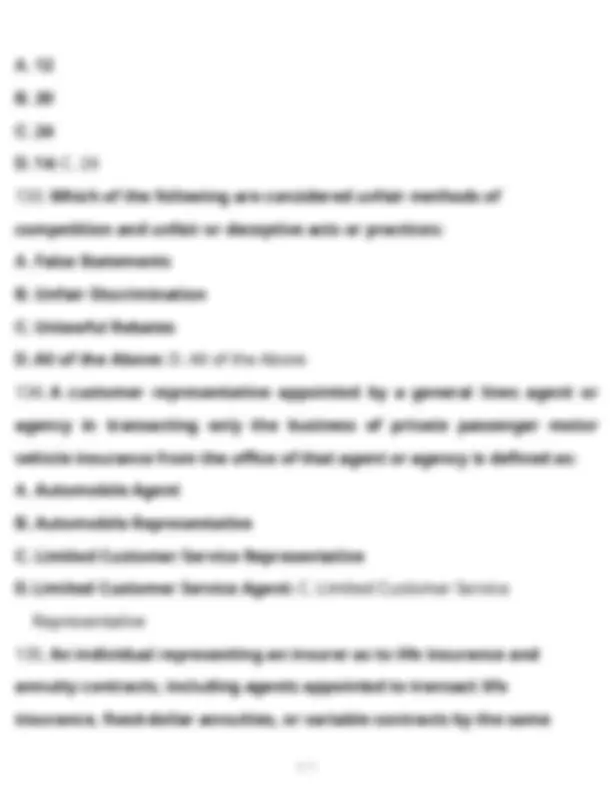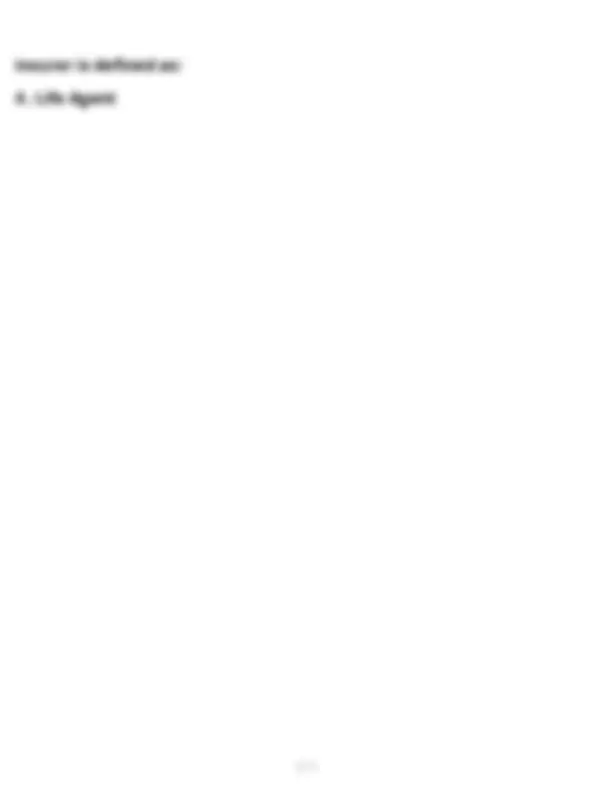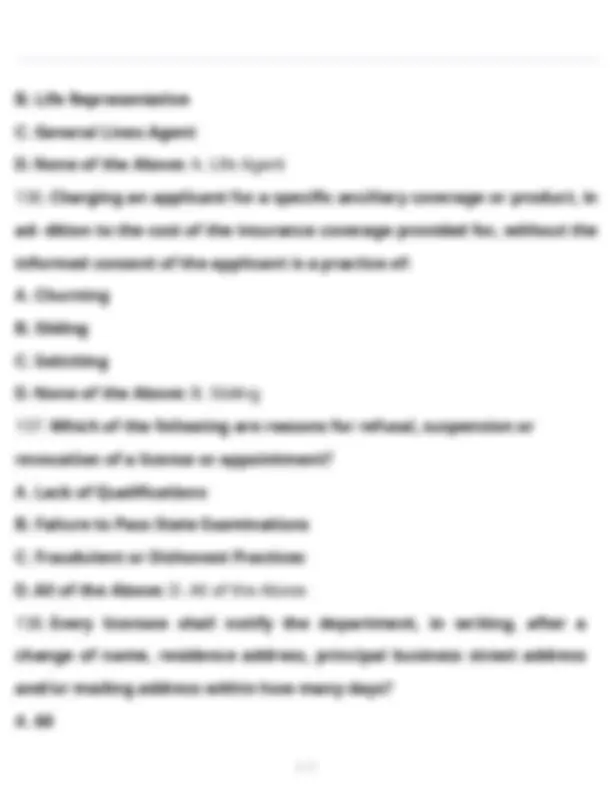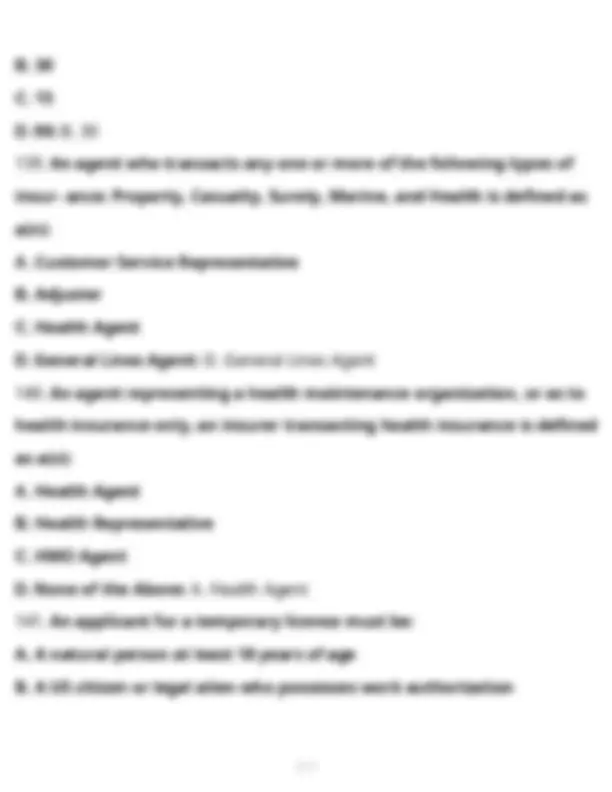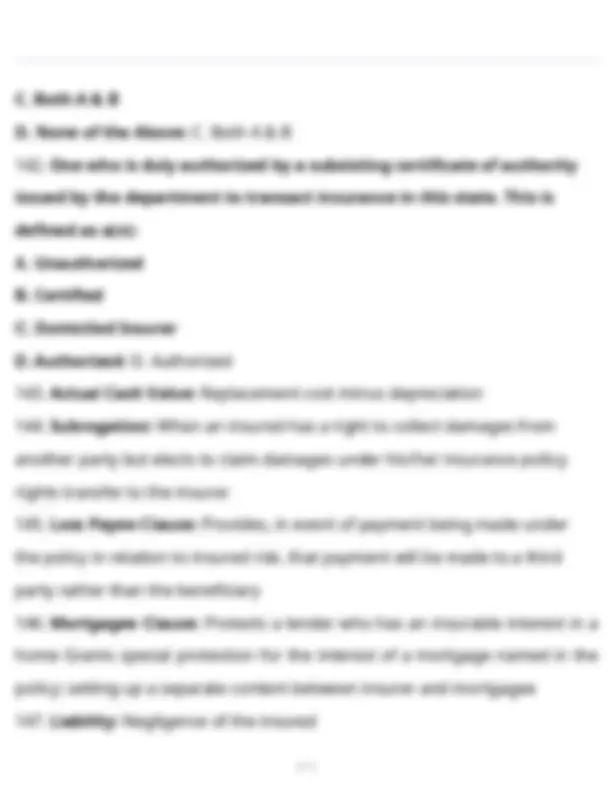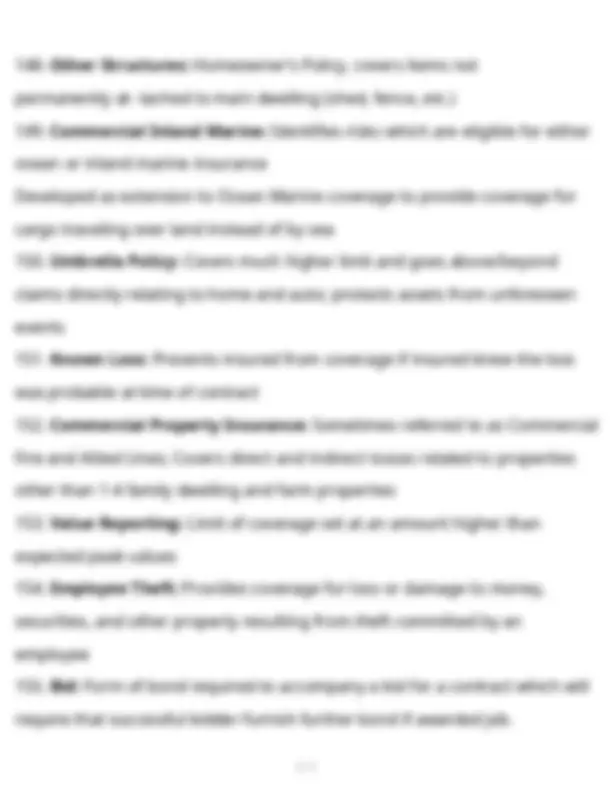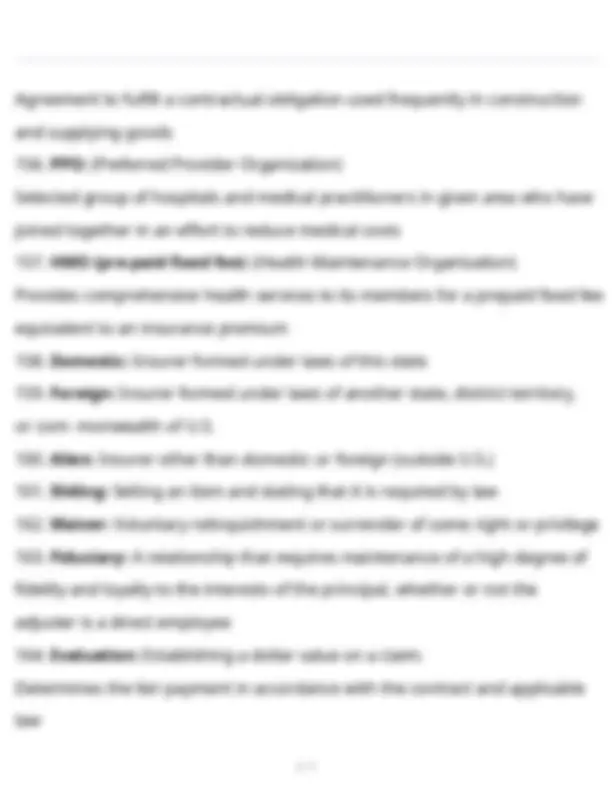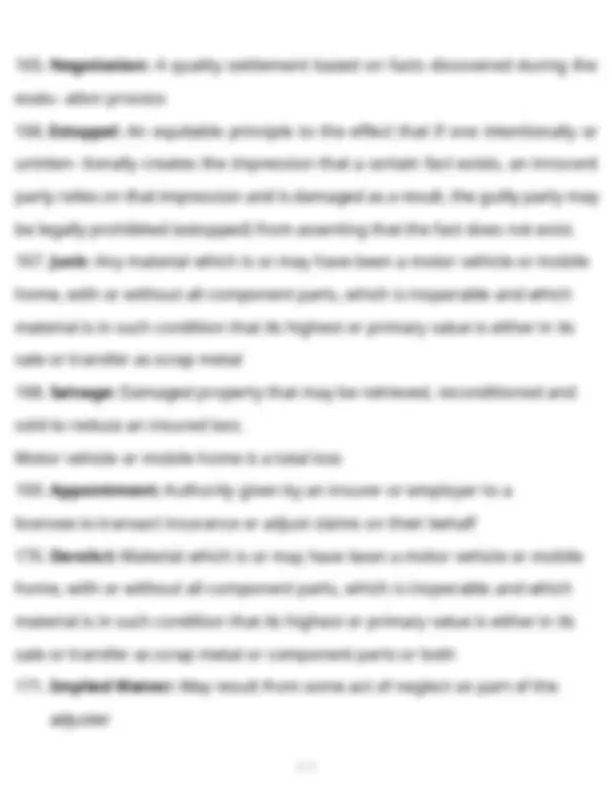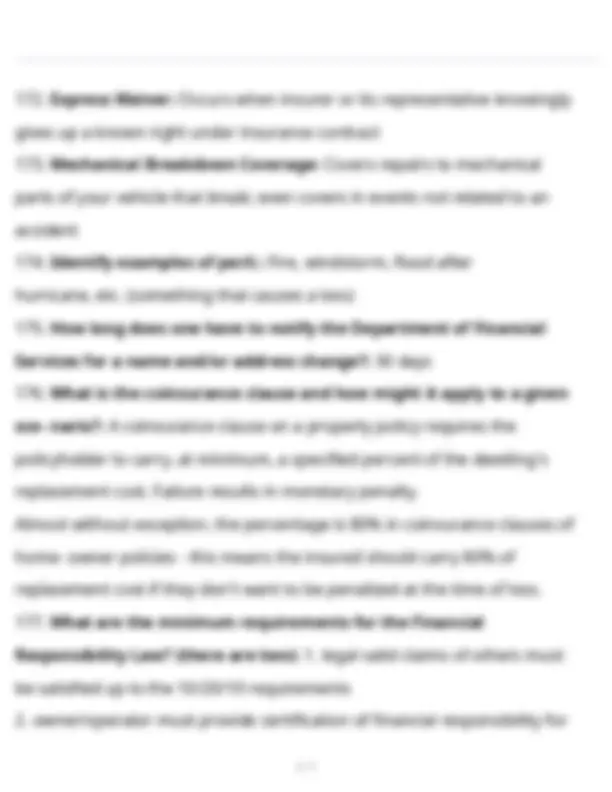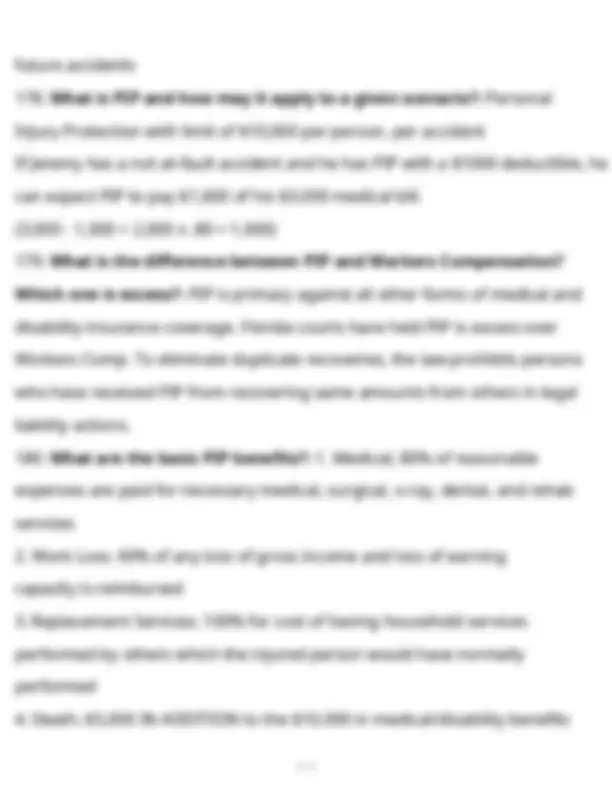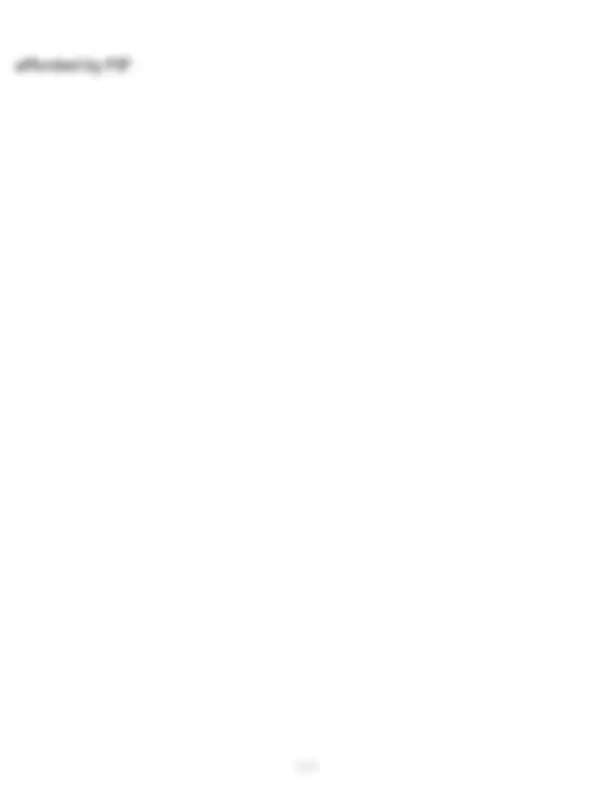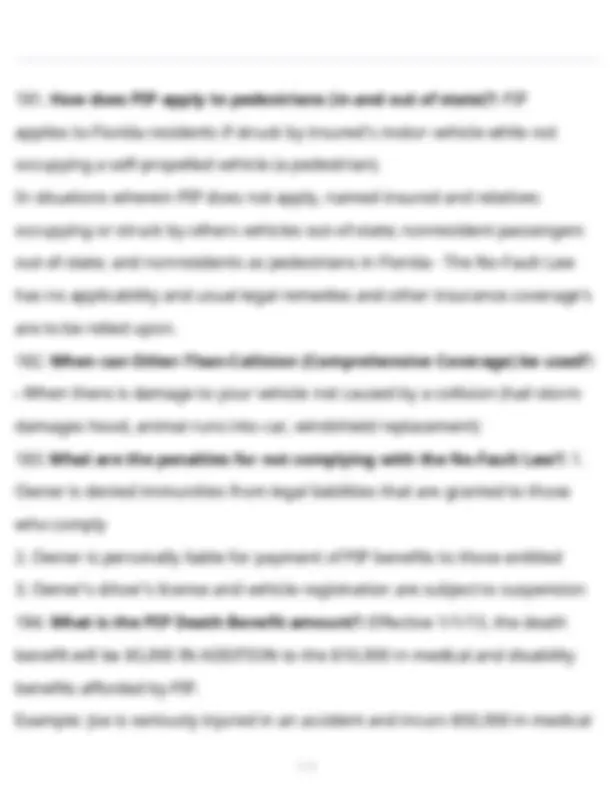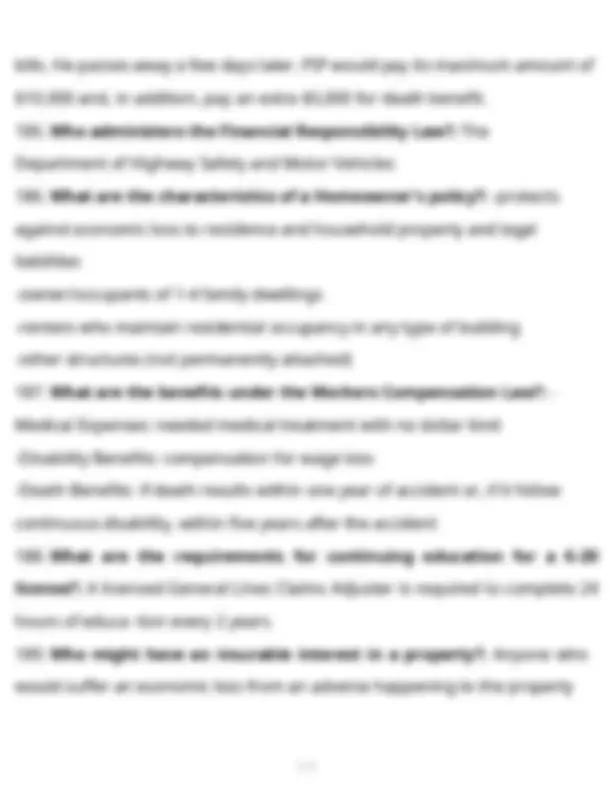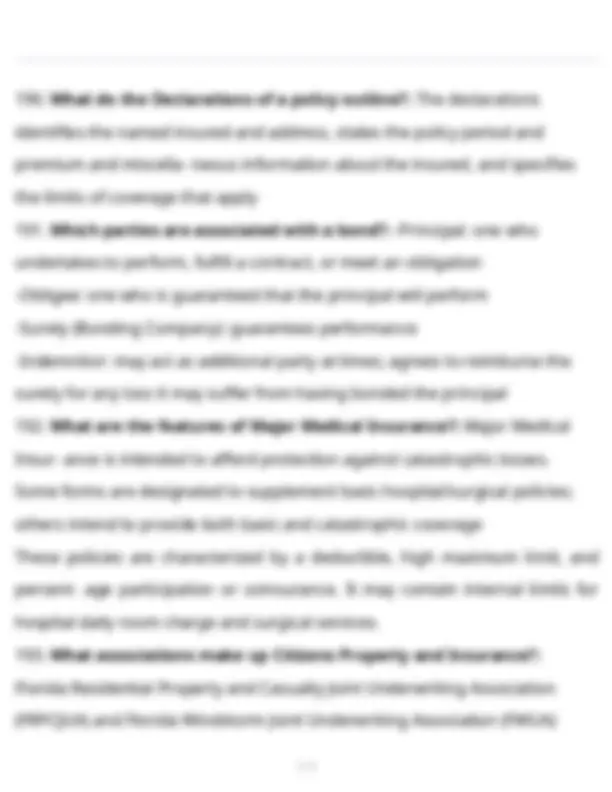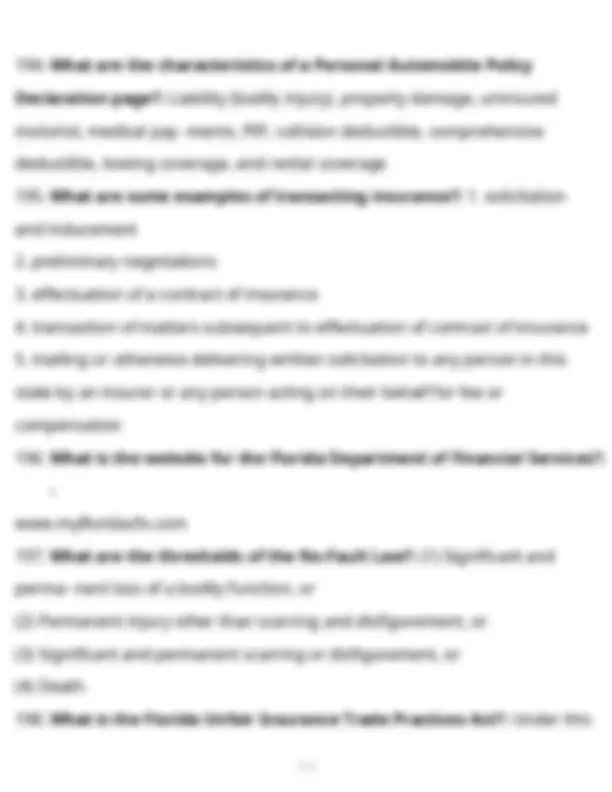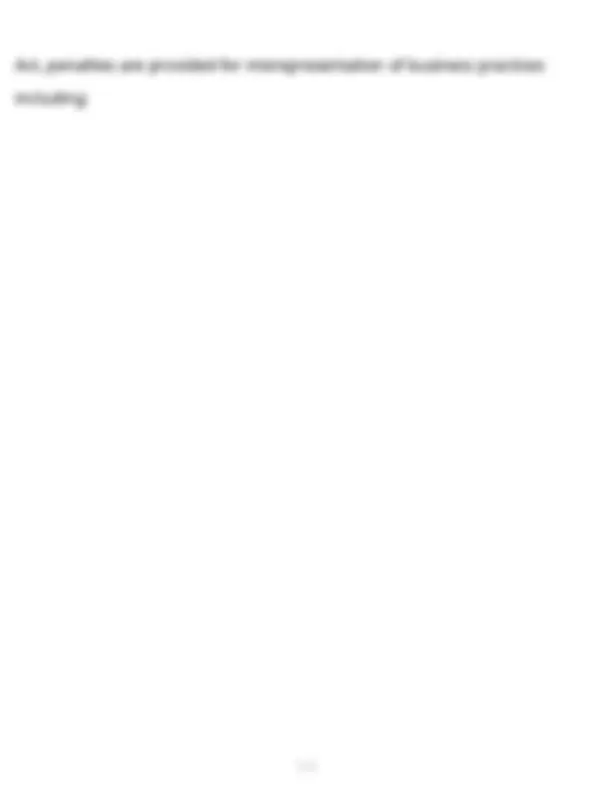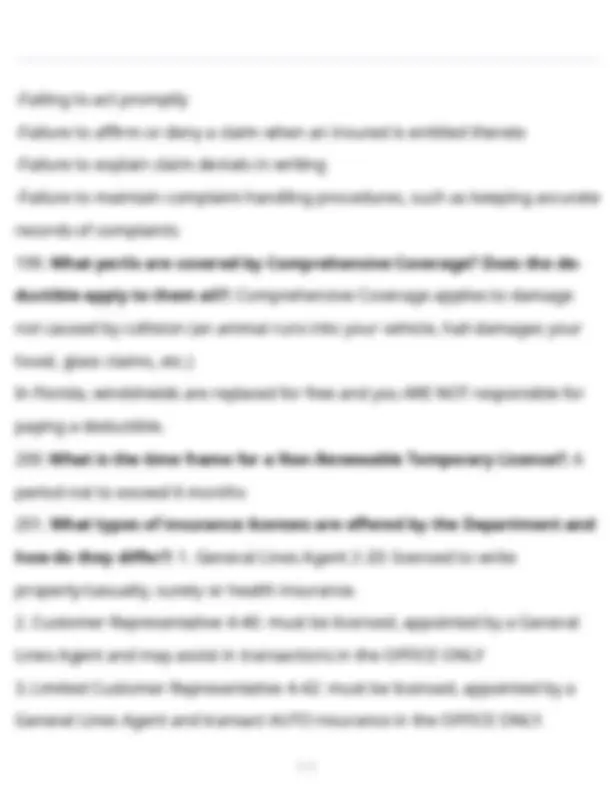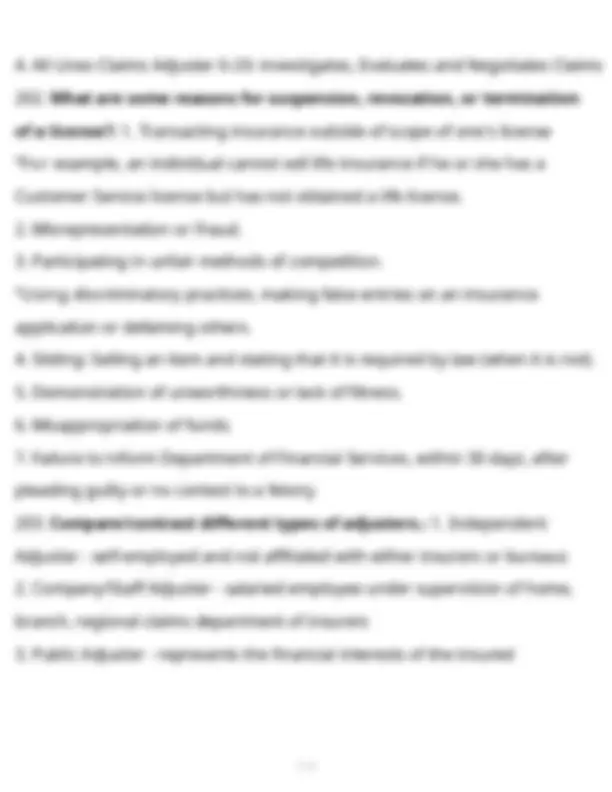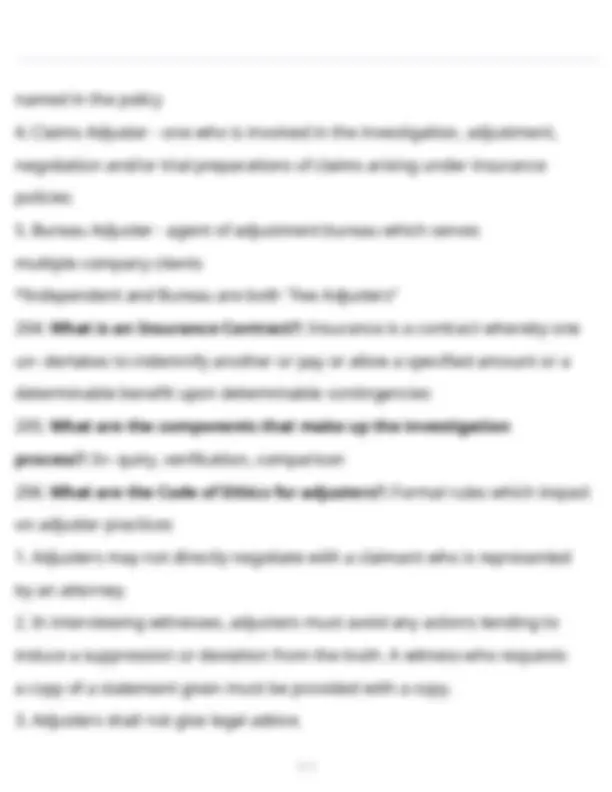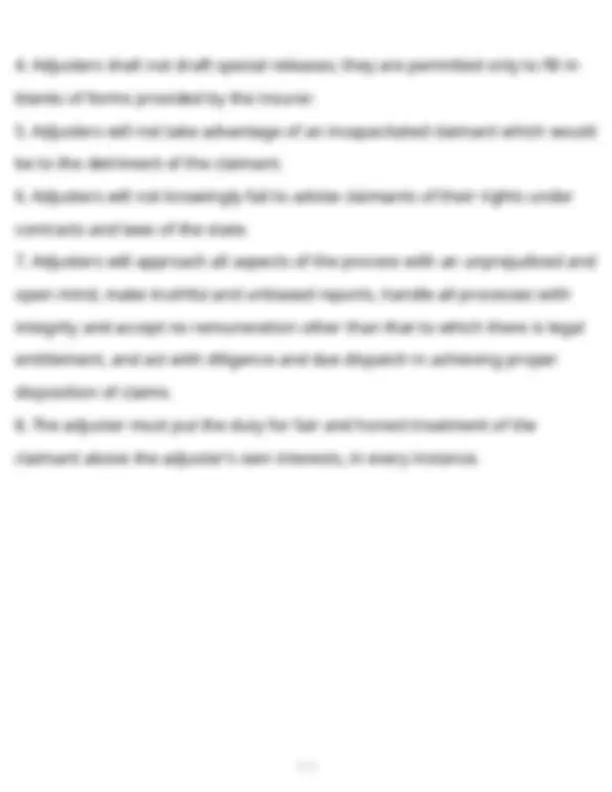Download Florida Claims Adjuster Exam Questions With 100% Correct Answers and more Exams Insurance Economics in PDF only on Docsity!
Florida Claims Adjuster Exam
Questions With 100% Correct
Answers
- Frank owned a home that was destroyed by a hurricane. Both ABC and XYZ Banks were listed as additional interests on his homeowner policy. The insurance company will make a payment to: A. The first mortgagee, ABC B. The Insured C. Jointly to ABC and XYZ D. All listed interests: D. All listed interests Remember that the insurer is not responsible to know the degrees of interest. In the event of a loss, one payment is made by the insurer and it is up to the additional interests on working out their share.
- Insurance applies separately to each insured as if other insureds did
not exist. This is defined as: A. Severability B. Conditional C. Warranty D. None of the above: A. Severability
- Property insurance policies usually contain a(n) clause,stating the insured cannot dump damaged property on the insurer and demand its full value: A. Pro Rata B. Abandonment C. Liberalization D. All of the above: B. Abandonment
- A(n) is one wherein economic loss would be suffered from an adverse happening to the subject: A. Conditional Contract B. Personal Contract C. Economic Contract D. Insurable Interest: D. Insurable Interest
- States that if the insurer adopts a revision which would broaden coverage without additional premium within some period of time prior to the policy period or during the policy period, the insured receives the
- The states that when there is an unbroken connection between an occurrence and damage that grows out of the occurrence, then the resul- tant damage is all a part of the occurrence. A. Doctrine of Proximate Cause B. Doctrine of Perils & Hazards C. Insurance Policy Handbook D. Doctrine of Property Insurance: A. Doctrine of Proximate Cause For example, if a property insurance policy covers the peril of fire but further damage is caused by smoke, water used to extinguish, and the process of moving property away - fire is considered to be the proximate cause of all of the damage.
- The Loss Settlement Valuation that subtracts an allowance for depreciation is defined as? A. Actual Cash Value B. Replacement Cost C. "Old for New" D. None of the Above: A. Actual Cash Value
- A policy condition, either based on information in the insured's application or inserted by the insurer, is defined as: A. Warranty
B. Misrepresentation C. Concealment D. None of the Above: A. Warranty
- The following are basic characteristics of a property or liability insurance contract, except: A. Personal Contract B. Conditional Contract C. Loss of Settlement Contract D. Contract of Adhesion: C. Loss of Settlement Contract
- The Insurer's responsibility to pay for a property loss may be conditioned on the insured having used reasonable means to avoid the loss, to protect the property against further loss, and to give the insurer proof of the loss is defined as? A. Conditional Contract B. Adhesion Contract C. Indemnity Contract D. All of the Above: A. Conditional Contract "may be conditioned"
- Which of the following is not one of the "Thresholds" in the "No- Fault" law?
- As to required proof for future accidents by purchase of auto liability in- surance, the insurer must make a filing (Form SR-22) certifying that coverage is in effect, and this certification must remain on file for years: A. 1 B. 3 C. 4 D. 2: B. 3
- The Business Automobile Policy includes all of the following coverage forms except: A. The Garage Coverage Form B. The Trailer Interchange Coverage Form C. The Truckers Coverage Form D. The Business Auto Coverage Form: B. The Trailer Interchange Coverage Form
- Personal Injury Protection, or PIP, has a per person, per acci- dent limit. A. 10, B. 20, C. 1, D. Depends on the damaged property: A. 10,
- Used to insure businesses engaged in selling, servicing, repairing, parking or storing automobiles: A. Servicing Coverage Form B. Garage Coverage Form C. Truckers Coverage Form D. None of the Above: B. Garage Coverage Form
- The following examples are referred to as liability limits: 25/50/25 or 10/20/10. A. Split B. Single C. Straight D. None of the Above: A. Split 10/20/10 = 10,000 per person injured 20,000 all injuries combined 10,000 property damage Example of straight liability limit = $30,
- Jeremy has a not at fault accident. If he has PIP with a $1, deductible, how much can he expect his PIP coverage to pay toward his medical bills that total $3,000?
C. Age & Gender of Insured D. Proximity to Fire Department: C. Age & Gender of Insured
- On a Homeowner's Policy, covers items that are not permanently attached to the dwelling. This is defined as: A. Other Structures B. Excess Structures C. Personal Property D. Dwelling: A. Other Structures Examples include sheds, fences, pool houses, detached car ports, etc.
- A lender has an insurable interest in a home and finds protection in the: A. Loss Payee Clause B. Mortgagee Clause C. Lender Clause D. Additional Insured Clause: B. Mortgagee Clause Mortgagee - Homeowner's policy Loss Payee - Automobile policy
- Which of the following forms is "all-risk" on the dwelling policy? A. DP-1, or the Basic Form B. DP-2, or the Broad
C. DP-3, or the Special Form D. None of the Above: C. DP-3, or the Special Form
- When the basic liability limits provided by the policy are insufficient for an insureds needs, two coverage forms are used to provide the additional amounts of coverage: A. Excess Liability B. Umbrella C. Both A & B D. None of the Above: C. Both A & B
- Which of the following is not covered under Coverage C, Personal Proper- ty? A. A fire breaks out in the residence and an overnight guest loses his clothes in the fire B. A fish dies because he has been left alone for a week without food C. The insureds daughters tennis racket is stolen from her locker D. The insureds suitcase and clothing, valued at $1,500, are stolen from his hotel: B. A fish dies because he has been left alone for a week without food Animals are listed as an "exclusion" under a Homeowner's policy.
- All of the following are eligible for a Homeowner's Policy, except? A. An apartment tenant
C. Loss of Use D. Insurers Duties: C. Loss of Use The insurer will pay any necessary and reasonable expenses associated with a daily living routine.
- An insured who wishes to purchase flood insurance, but is located in a moderate or low risk flood zone may do so by purchasing a: A. Preferred Risk Flood Policy B. Standard Flood Policy C. Universal Flood Insurance D. None of the Above: A. Preferred Risk Flood Policy Although Flood Insurance is provided by the Federal Government, those who are not in a "flood zone" may purchase a preferred risk policy to cover them for a flood claim.
- Used only for Commercial Condominiums, it covers the unit-owners busi- ness personal property and the personal property of others in the insured's care, custody or control: A. Condominium Dwelling Form B. Personal Condominium Unit Owners Form C. Condominium Unit Owners Form D. None of the Above: C. Condominium Unit Owners Form
Does not cover buildings since coverage would typically be provided under the Condo Association coverage form issued.
- The Commercial Property Contract includes all of the following, except: A. Common Policy Conditions B. Commercial Property Conditions C. Coverage Form D. Commercial Loss Schedule: D. Commercial Loss Schedule Also included: Declarations, Causes of Loss Form, Endorsements
- Insures a condominium association against direct physical loss or damage to buildings, business personal property and personal property of others in the care, custody or control of the association and located at the premises: A. Condominium Association Form B. Condominium Unit Owners Form C. Condominium Insured Owner Form D. None of the Above: A. Condominium Association Form This, along with Condo Unit Owners Form, is located under Condo Coverage.
- Sometimes referred to as commercial fire and allied lines, this is the form of insurance that covers direct and indirect losses related to
D. None of the Above: A. Value Reporting Replacement Cost is incorrect b/c it calculates monetary value of one's personal property
- Liberalization states, "The insured gets the benefit of any broadened cov- erage if the company, within days of inception, adopts a form revision that is broader and without increase in premium." A. 10 days B. 55 days C. 65 days D. 45 days: D. 45 days
- Used to cover buildings in the course of construction: A. Builders Risk Policy B. Builders Replacement Policy C. Construction Replacement Policy D. None of the Above: A. Builders Risk Policy Includes: structure being built (including foundations), fixtures and machinery, equip- ment to service building, owned materials and supplies used for construction. Temporary structures built or assembled on site are also included if not covered by insurance.
- First developed as an extension of Ocean Marine coverage, to provide coverage for cargo traveling over land, instead of by sea. A. Commercial Inland Marine Coverage B. Personal Inland Marine Coverage C. Ocean Commercial Coverage D. None of the Above: A. Commercial Inland Marine Coverage Definition: to help identify kinds of risks which are eligible for either Ocean or Inland Marine insurance.
- Protects against loss of business income that results from damage to covered property from a covered cause of loss. A. Business Income Insurance Coverage B. Business Income Replacement Coverage C. Business Income Actual Value Coverage D. None of the Above: A. Business Income Insurance Coverage Period of restoration begins 72 hours after date of direct damage. In effect, coverage has a 72 hour deductible. Coverage ends on either 1. date when damaged property could be repaired, re- built, or replaced 2. date business resumes operations at new, permanent location (whichever comes first)
Liability Contract? A. Declarations B. Common Policy Conditions C. Occurrence and Claims-Made Forms D. All of the Above: D. All of the Above Also included: Nuclear Energy Liability Exclusion endorsement (other endorsements may be attached)
- There is coverage for injury, damage or clean-up costs caused by pollutants, subject to minor exceptions: A. 50% B. 10% C. 0% D. A Percentage Ratio: C. 0%
- Under a Commercial General Liability Policy, a basic limit of per person applies to Medical Payments: A. $1, B. $10, C. $2, D. $5,000: D. $5,
Payment is for medical, dental, hospital, and funeral services incurred within one year of date of accident to persons who suffer bodily injury by accident 1. on or next to insured's owned or rented premises, or 2. due to insured's operations.
- The Commercial General Liability identifies the named insured and address, states the policy period and premium and miscellaneous infor- mation about the insured, and specifies the limits of coverage that apply. A. Declarations B. Contract C. Policy D. None of the Above: A. Declarations States the pertinent information of the policy
- The Nuclear Energy Liability Exclusion endorsement, in general, all hazards related to nuclear energy. A. Includes B. Excludes C. Prohibits D. Summarizes: B. Excludes

